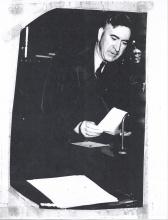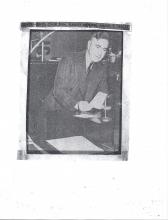WAS User Menu
Scrapbook 3
THE ARTHUR A. OHNIMUS COLLECTION
Click on the descriptions below to view the document.
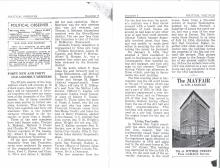
Political Observer December 2
Political Observer
409 Plaza Bldg. Phone M-2270
Sacramento, California
Subscription…..$5.00 per year
Advertising Rates Quoted on Query.
Kenneth Medcraft………Editor
C. D. LeMaster……Business Mgr.
Our Aims and Purpose
There is a fraternity of men and women interested in politics-public business.
This modest publication intends to act as “house organ” for those public-spirited citizens who participate in the activities of the public life of our State.
It shall be the aim of this paper to record events in a strictly reportorial manner, and to conduct an open forum for contributors who care to avail themselves of its columns.
Forty New and Forty Old Assembly Members
The fiftieth session of the Legislature which will convene at 12 o’clock noon, January 2nd (Monday) will be composed of forty-sex members who were not members of the Assembly of the 1929 session. Six of these members have seen service in former sessions, however. Thus there are forty new members and forty old members. This is the largest turnover witnessed in the Assembly in more than a decade.
There of the new members have held Senate seats, Thomas A. Maloney, Herbert J. Evans and Charles W. Lyon. There are former members of the Assembly, Albert F. Ross, Albert H. Morgan and Clare Woolwine.
Of the nine members of the Assembly from San Francisco, seven were reelected. By reason of the reapportionment of districts, Fred C. Hawes and Chas. A. Oliva and James L. Quigley did not seek reelection. Harry Morrison was the only member who was not returned, and Thomas A. Maloney (incumbent senator) won the Oliva-Hawes district. The one new face from San Francisco is that of Patrick J. McMurray (Democrat).
Alameda County delegation is represented by three new faces-William Knowland, James M. Cassidy, and Henry P. Meehan, Albert H. Morgan, Jr., was a member four years ago, and has been returned by the Berkeley district.
In the north Albert F. Ross takes the seat formerly held by Judge McGuinness, and Michael J. Burns succeeds Robert F. Fisher and George M. Bigger (district reapportioned). Jesse M. Mayo will take H. E. Dillinger’s seat from the Mother Lode district. Clifford C. Anglim will represent Contra Costa County in place of Robert P. Easley. James E. Thorp takes the place of Frank S. Israel, who did not run and who has since died. Frederick Petersen comes from San Mateo County and takes the seat of Harry Parkman, elected to the Senate. C.C. Cottrell, San Jose, moves into T. M. Wright’s place, Wright did not run. Clifford R. Kallam succeeds Bert B. Snyder, now in the Senate from Santa Cruz County. Ellis E. Patterson takes Senator Jespersen’s place.
J.J. McBride (Democrat) succeeds Dan Emmett. Rodney L. Turner (Mayor of Delano) takes the place of Robert Lincoln Patterson. He is a Democrat.
The new members from the
Political Observer December 2
For the first five days the speaker’s rostrum was a flour barrel covered with a board, and the members of both houses sat around on nail kegs or any other type of seat they could procure. General Vallejo became financially involved about that time, and was unable to make good either in securing the site or in raising the money he promised.
On January 9, 1852, they adopted a joint resolution to meet in Sacramento on the 16th. Consequently, they bundled up, bag and baggage, and took passage on the steamer “Empire” leaving Vallejo one afternoon at three o’clock, arriving in Sacramento the next morning.
The first meeting place in Sacramento was the old court house at 7th and “I” Streets, which was occupied during the year 1852, Sacramento experienced a very disastrous flood, and on February 4th of that year they moved to Benicia, Benicia having offered them the use of the city hall and other accommodations. This building still stands and is now used as city hall, library and fire engine house for the city of Benicia.
Living Too Costly
In Benicia they found practically the same conditions as in San Jose, namely, that the tradespeople raised their prices on foodstuffs and lodgings, and the legislators again returned to Sacramento in 1854 and again met in the old court house at 7th and “L” Streets. This building was destroyed by fire on July 13, 1854. On the west wall of the assembly chambers, in the court house, there hung a life-sized picture of George Washington, painted by Jane Stewart, a daughter of James the noted artist, and was a copy of the original now in Boston. The Democratic State Journal, in an issue of July 14, 1854, chronicles the fact that Governor Bigler, together with other state officials, rushed into the building during the progress of the fire and rescued the picture. This picture now hangs in the Senate Chamber of our present capitol building. Before the embers were cold, work was started on a new court house and was completed in time for the 1855 legislature.
The Mayfair in Los Angeles
Picture of a building here.
7th at Witmer Street
Free Garage Service
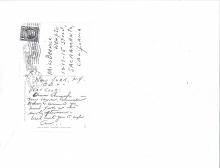
This page displays a post card addressed to:
Miss Bernice Wemple
1217-15 Street
Sacramento, California
There is a postmark stamped from New York dated Oct 2nd.
The handwritten message reads:
New York, N.Y. Oct 2
Dear Cook:
Drove through New Haven, Connecticut today and arrived in New York at hour early afternoon.
*The last sentence of the message is unreadable.
-Arthur
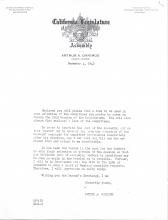
District Attorney’s Office
550 Montgomery Street
San Francisco
California Legislature
Assembly
Arthur A. Ohnimus
Chief Clerk
December 4, 1942
Enclosed you will please find a form to be used in your selection of the committees you prefer to serve on during the 1943 Session of the Legislature. You will also please find enclosed a list of the committees.
In order to expedite the work of the Assembly, and so that whoever may be Speaker may have the advantage of the Members’ requests for committee preferences immediately after his election, may I ask that you fill out the enclosed form and return to me immediately.
It has been the custom in the past for the Members to make their selection in advance of the Session so that the difficult work of assigning Members to committees may be done as early in the Session as is possible. Further, I will be in Sacramento from the 11th to the 14th of December to make a chart of Members committee requests. Therefore, I will appreciate an early reply.
Wishing you the Season’s Greetings, I am
Sincerely yours,
Arthur A. Ohnimus
AAO:IM
Encl-2
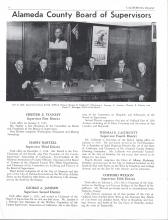
Alameda County Board of Supervisors
Picture here: Group of men sitting at a table facing towards the camera
Description under the picture reads: Left to right Supervisors Harry Bartell, Clifford Wixson, Thomas E. Caldecott (Chairman), George A. Janssen, Chester E. Stanley and Lloyd F. Groogan, Clerk of the Board.
Chester E. Stanley
Supervisor First District
Took office on January 8, 1945.
Mr. Stanley is also Chairman of the Committee on Roads and Franchises of the Board of Supervisors.
First District comprises Washington, Pleasanton and Murray Townships.
Harry Bartell
Supervisor Third District
Took office on December 2, 1938. Mr. Bartell is the Vice Chairman of the Board; also Past President of the County Supervisors’ Association of California; Vice-President of the National Association of County Officials; Chairman of the Board of Trustees of the Alameda County War Effort Organization, and Chairman of the Committee on Auditing and Finance of the Board of Supervisors.
Third district comprises all of the City of Alameda and that part of the City of Oakland bounded on the West by Adeline Street, on the North by 20th Street, on the East by 13th Avenue, and on the South by the Estuary.
George A. Janssen
Supervisor Second District
Took office April 1, 1933, and served as Chairman of the Board of Supervisors for six and one-half years. Mr. Janssen is a Director and Chairman of the Welfare Committee of the County Supervisors’ Association of California is also Chairman of the Committee on Hospitals and Infirmaries of the Board of Supervisors.
Second District comprises that part of Oakland East of 13th Avenue, including all of Eden Township and the towns of San Leandro and Hayward.
Thomas E. Caldecott
Supervisor Fourth District
Mr. Caldecott is Chairman of the Board, taking office on January 9, 1945. He previously served as its Vice-Chairman. He is President of Joint Highway District No. 26 of the State of California, and Chairman of the Alameda County Postwar Planning Committee. Mr. Caldecott was previously Councilman of the City of Berkeley for ten years; also served as its Mayor for two years.
Fourth District comprises the Cities of Albany, Piedmont, Berkeley, and that part of the City of Oakland bounded on the South by East 20th Street, on the West by Broadway and College Avenue, and on the East by 13th Avenue and its extension.
Clifford Wixson
Supervisor Fifth District
Took office on January 1, 1933. He is Chairman of the Committee on Buildings and Estuary Bridges of the Board of Supervisors. Mr. Wixson previously served as Assemblyman from Alameda County.
Fifth District comprises all of that portion of the City of Oakland from Adeline Street West to San Francisco Bay, North of 21st Street and Adeline Street, West of Broadway and College Avenue, and South of the city limits of Berkeley, including the town of Emeryville.
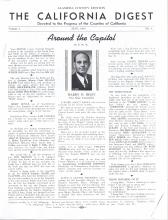
ALAMEDA COUNTY EDITION
THE CALIFORNIA DIGEST
Devoted to the Progress of the Counties of California
Volume 3 MAY, 1945 No. 4
Around the Capitol
By P. M. M.
Your EDITOR is now Assistant Sergeantat-Arms in the Assembly at the North Gate, and while on the subject of Attaches, we note that Chief Clerk ARTHUR OHNIMUS has six members of the "fair sex" to three of the masculine working at the desk.
Arthur says his girls are giving him the most efficient service he has had at the Desk in many sessions.
Not to be outdone, Chief Sergeant at Arms WILKIE OGG has a Page Girl on HIS staff.
•
The only Attache from the Redwood Empire is Assistant Minute Clerk LILLIAN SLATER from Santa Rosa, and speaking of Lillian, our agent advises that she and ETHEL BROCKELBANK (History Clerk) were seen having a Coca Cola with Assemblyman JOHN PELLETIER, be careful girls, John is one of the few bachelors in the House—and we understand he carries a "Wolf" license!
•
JIMMY DOYLE, son of Assemblyman Doyle (Los Angeles) is the man who controls the voices of the Assemblymen, through the microphone control in the balcony.
•
Republican Floor Leader Sam Collins has a faculty of "pouring oil on troubled waters" when other get a little riled in debates.
•
In checking over seating arrangements in
the Assembly, we find two interesting examples of perfect harmony between opposing
Parties—Democratic Minority Floor Leader
Alfred W. Robertson seated next to Montivel
A. Burke, Republican from Alhambra, and
Republican Majority Floor Leader SAM L.
COLLINS seated next to Ralph C. Dills, Democrat; however, we recall—Sam and Ralph were elected at the Primaries by both Parties.
•
We would like to call the attention of you pipe smokers to J. G. (Judge) Crichton from Fresno, and his fine collection of pipes. As near as we can ascertain, the Judge has a different pipe for each day of the week and they are NOT the corn cob variety either.
History is being made in the Assembly by the two DILLS brothers, RALPH and CLAYTON, who have the distinction of being the first brothers to sit in the Assembly at the same sessions. Ralph hails from Compton, the City Los Angeles overlooked in its movement to the sea, and Clayton comes from Gardena, a nearby suburb of Compton; also overlooked by Los Angeles. Speaking of the DILLS boys, Ralph just finished his Law Exams, and as a Neophyte will add one more name to the Barristers sitting in the as‑
(Self-Portrait of Harry B. Riley Here)
HARRY B. RILEY Our State Controller
A WORD ABOUT HARRY who has been seriously ill for several months.
We want to extend our sympathy to Harry and wish him a speedy recovery. The old Capitol doesn't seem quite the same without him.
Mr. Riley wrote his Holiday Greeting Message, which was published in the December issue of the "Digest" (along with other State Officials) from his sick bed in the hospital, and had one of his assistants deliver it personally.
There are a lot of grand people in this world—the thoughtful understanding kind-- and we mention this only to let you know, and to say, we think it was pretty swell of Harry.
sembly. Let us NOT forget VINCENT THOMAS, who will also become an Inner Barrister next October. Vince resides in the place Los Angeles DIDN'T pass up—San Pedro.
We agree with many of our State and County Officials, it is an education to listen to Assemblyman GARDINER JOHNSON (Berkeley) on Parliamentary Procedure, and believe everyone will concede Gardiner as "tops" on this subject.
•
ALLEN G. (SCOOP) THURMAN, representing the 6th Assembly District, has four Senators (Seawell, Mayo, Dillinger and Brown) to assist him with his District. The 6th District comprising ten Counties (Alpine, Amador, Calaveras, El Dorado, Inyo, Mariposa, Mono, Nevada, Placer and Tuolumne) is divided into Four Senatorial and One Assembly.
With such a big District to cover, it is astonishing how Scroop finds the time, and incidentally the gas, in these days of rationing, etc.
•
After hearing ALBERT DEKKER recite, several poems which were submitted by aspirants to the position of “Poet Laurette” of California, we are convinced Albert would make a leading candidate himself.
10-
One Page Boy who made good, JOHNNY EVANS, who represents the 65th Assembly District in Los Angeles. Johnnie who is an accountant, also served as an Assembly Attache, before he was elected to the Assembly.
•
THE THIRD HOUSE
In case some are not acquainted with legislative procedure at the Capitol, we might state that one of the most important functions is the "THIRD HOUSE," or the boys behind the rail; namely, our "LOBBYISTS." During the Session, practically everyone of importance sooner or later joins the ranks of the "Third House." Some stay for just one day, others stay a week or two, while some remain the entire session.
BILL JASPER, representing the California State Brewers' Institute has never missed a day—next in line is ED LONG of Pacific Gas and Electric Company; then—DON CLEARY of the City and County of San Francisco, JIM PHILLIPS of State Employees Association, FRED ALEXANDER of the County Supervisors Association, UNCLE WILL FISHER, the “Dean of Lobbyists," BEN READ, Public Health League of California, DON GALLAGHER, State Compensation Insurance Fund, and MANY others- not forgetting one lady lobbyist, DR. RUBY HOFFMAN of San Francisco. We understand this was Dr. Hoffman's first experience at lobbying, and from what we hear, she made a very good impression and did a. splendid job in her endeavors.
•
If by chance you don't know ROLLAND VANDERGRIFT (Legislative Auditor) by sight, just look for the man running around the Capitol with a LARGE sheaf of papers under his arm.
•
THINK NOTHING OF IT
Young Man: "I have a confession to make before I can ask you to marry.me!"
Young Girl: "What is it?"
Young Man: "My father served a term in the penitentiary."
Young Girl: "Oh, that's nothing, my father served two terms in the Legislature."
Published monthly by P. M. Millspaug h. Editorial and Business Office, 619-ATwelfth Street, Sacramento 14, California. Telephone 2-0502.
P. M. Millspaugh, Editor: S. A. Bunte, Associate Editor. Subscription: $2.00 per year. Single copy, 25c.
Danner Publishing Co., San Francisco 51
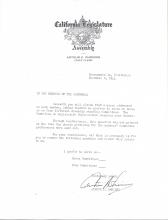
California Legislature
Assembly
Arthur A. Ohnimus
Chief Clerk
Sacramento 14, California
December 6, 1944
To the members of the Assembly:
Herewith you will please find a query, addressed to each member, asking whether he prefers to serve on three or four different Assembly standing committees. The Committee on Legislative Organization requests your answer.
Through inadvertence, this question was not printed at the time the charts providing for the members’ committee preferences were sent out.
For your convenience, all that is necessary is for you to answer the following question and return this letter to me.
I prefer to serve on—
Three Committees____
Four Committees____
Sincerely yours,
Arthur A. Ohnimus (Signature)
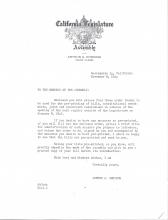
California Legislature
Assembly
Arthur A. Ohnimus
Chief Clerk
Sacramento 14, California
November 8, 1944
To the members of the Assembly:
Enclosed you will please find three order blanks to be used for the pre-printing of bills, constitutional amendments, joint and concurrent resolutions in advance of the opening of the next regular session of the Legislature on January 8, 1945.
If you desire to have any measures so pre-printed, if you will fill out the enclosed order, giving a brief title for identification of each measure you propose to introduce, and return the order to me, signed by you and accompanied by the measures you desire to have pre-printed, I shall be happy to see that the bills are pre-printed and sent to you.
Having your bills pre-printed, as you know, will greatly expedite the work of the assembly and give to you a printed copy of your bill before its introduction.
With best and kindest wishes, I am
Cordially yours,
Arthur A. Ohnimus
AAO:ds
Encl-3
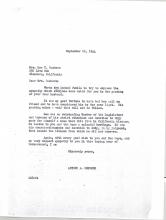
September 1, 1944
Mrs. Lee T. Bashore
250 Live Oak
Glendora, California
Dear Mrs. Bashore:
Words are indeed futile to try to express the sympathy which everyone here holds for you in the passing of your dear husband.
It was my good fortune to have had Lee call me friend and to have considered him in the same light. His passing makes a void that will not be filled.
Lee outstanding Member of the Legislature and because of his strict attention and devotion to duty made for himself a name that will live in California history. He leaves to you and the boys a splendid heritage. It was his conscientiousness and devotion to duty, in my judgment, that caused the illness from which he did not recover.
Again, with every good wish to you and the boys, and my very deepest sympathy to you in this trying hour of bereavement, I am
Sincerely yours,
Arthur A. Ohnimus
AAO:ds
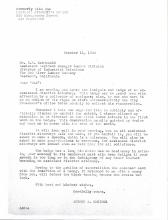
Formerly with the
District Attorney’s office
550 Montgomery Street
San Francisco
October 11, 1944
Mrs. S.W. Macdonald
Assistant Resident Manager Lumber Division
Director of Industrial Relations
The Red River Lumber Company
Westwood, California
Dear “Mac”:
I am sending you today the insignia and badge of an ex-assistant district attorney. This badge may be gazed upon with affection by a collector of antiques; also, by one who wore it as an emblem of his right to visit uninterruptedly the City Treasurer’s office twice monthly to collect his remuneration.
Whenever I felt the urge and itch to publicly and officially display or exhibit the shield, I always allow my attention to be directed to the first three letters in the first word on the badge. This observation usually quieted my desire and kept me in peace with the rest of the world.
It will look well in your keeping, but as all assistant district attorney talk too much, if you exhibit it, you will be asked to make a speech, which is a nuisance. You will also be asked to make contributions to everyone, for assistant district attorneys are looked upon as fair prey for all solicitors.
The badge has a long pin which has no hesitancy in sticking to your anatomy in its tenderest part with deep delight if your speech is too long or in the indulgence of any other conduct becoming an assistant district attorney.
Bowing to the goblins of superstition the enclosed card with the insertion of a penny, if returned to me with a penny from you, will defeat the black dancing demons who create bad luck.
With best and kindest wishes,
Cordially yours,
Arthur A. Ohnimus
AAO:o
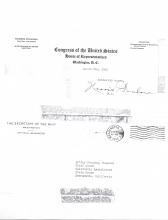
This page displays 2 items: a document and the front of an envelope.
First item reads:
Norris Poulson
13th Dist. California
Miss Delphine W. Brune
Secretary
Committees:
Expenditures in the Executive Department
Flood Control
Congress of the United States
House of Representatives
Washington, D.C.
March 8th, 1943
Sincerely yours,
Norris Poulson
M.C.
Second item is the front of an envelope it reads:
The Secretary of the Navy Stamp here: Washington 1943 Feb 24 4-PM
Washington
Official Business
Arthur Ohnimus, Esquire
Chief Clerk
California Legislature
State House
Sacramento, California
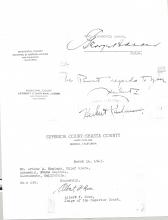
This page displays signatures for the following 4 Judges:
First Judge:
Municipal Court
George B. Harris, Judge
San Francisco
California
Very sincerely yours,
(Signature of George B. Harris here)
Second Judge:
Municipal Court
Hebert C. Kaufman, Judge
San Francisco
California
Third Judge:
Handwritten note reads:
The best regards to you
(Signature of Herbert E. here)
(Another signature here but this time it is signed with his last name, Herbert Kaufman)
Fourth Judge:
Superior Court-Shasta County
Albert F. Ross Judge
Redding, California
Mr. Arthur A. Ohnimus, Chief Clerk,
Assembly, State Capitol,
Sacramento, California.
Dear Art:
Sincerely,
(Signature of Albert F. Ross here)
Albert F. Ross, Judge of the Superior Court.
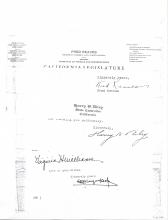
This page displays 4 signatures.
First signature:
Fred Reaves
Member of Assembly, Sixty-Eighth District
Chairman
Committee on Prisons and Reformatories
California Legislature
Sincerely yours,
(Signature of Fred Reeves here)
Fred Reaves
Second Signature:
Harry B. Riley
State Controller
California
Sincerely,
(Signature of Harry B. Riley here)
Third Signature:
(Signature of Virginia, last name is not readable)
Fourth Signature:
Lots of good wishes
Sincerely yours,
(Signature unreadable)
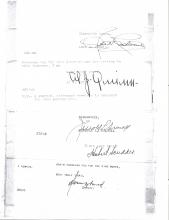
This page displays 5 signatures.
First signature:
Sincerely yours,
(Signature of Kent H. Redwine here)
Kent H. Redwine
KHR: BM
Second signature:
Thanking you for your courtesy and cooperation in this instance, I am
Very truly yours,
(Signature of Al J. Quinn here)
Al J. Quinn
AJQ/om
P.S.-A stamped, addressed envelope is enclosed for your convenience.
Third signature:
Sincerely,
(Jerrold L. Seawell signature here)
Jerrold L. Seawell
JLS: g
Fourth signature:
Yours very truly
(Hubert Scudder here)
Fifth signature:
Again thanking you for the kind words,
Very truly yours,
(Signature is unreadable here)
Deputy.
CHS: O

This page has 4 signatures.
First signature:
Sincerely,
(Signature unreadable)
Chief Clerk
M. A. Page: MCF
Second signature:
Angelo J. Rossi
Member
U.S. Conference of Mayors
Sincerely yours,
(Angelo J. Rossi signature here)
Mayor.
Third signature:
Sincerely,
(Ellis E. Patterson signature here)
Lieutenant Governor
eep-f
Fourth Signature:
With kindest regards,
Sincerely yours,
(Ellis E. Patterson Signature here)
Ellis E. Patterson
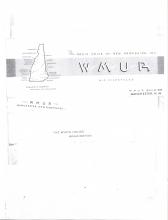
An outlined map of New Hampshire is here. The names of the city in New Hampshire are labeled on the map as well.
The Radio Voice of New Hampshire, Inc.
WMUR
610 Kilocycles
WMUR Building
Manchester, N.H.
WMUR
Manchester, New Hampshire
The White House
Washington
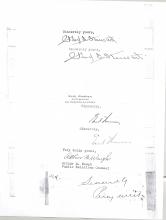
This page shows 4 different people’s signatures.
First shows 2 signatures from Gary E. Stewart
Sincerely yours,
(Gary E. Stewart signature here)
Sincerely yours,
(Gary E. Stewart signature here)
Second shows 2 signatures from Earl Warren:
Earl Warren
State Building
San Francisco, California
Sincerely,
(Signature of Earl Warren here)
Sincerely,
(Signature of Earl Warren here)
Third signature:
Very truly yours,
(Signature of Arthur B. Waugh here)
Public Relations Counsel
Fourth signature
Sincerely
(Perey Weil signature here)
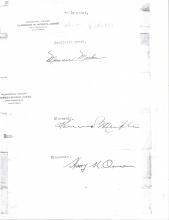
This page displays 4 signatures.
First signature:
Municipal Court
Clarence W. Morris, Judge
San Francisco
California
Sincerely yours,
(Clarence W. Morris signature here)
Second signature:
Cordially yours,
(Maurice Meeker signature here)
Third signature:
Municipal Court
Theresa Meikle, Judge
San Francisco
California
Sincerely,
(Theresa Meikle signature here)
Fourth signature:
Sincerely,
(Harry K. Orman signature here)
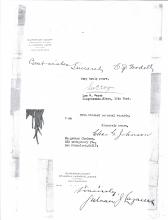
This page displays 4 signatures.
First signature:
Superior Court
Department Sixteen
C.J. Goodell, Judge
City Hall
San Francisco
Best wishes sincerely, (C.J. Goodell signature here)
Second signature:
Very truly yours,
(Lee E. Geyer signature here)
Congressman Elect, 17th Dist.
Third signature:
With kindest personal regards, I am
Sincerely yours,
(Signature of Chas Johnson here, middle initial is unreadable)
Mr. Arthur Ohnimus,
333 Montgomery St.,
San Francisco, Calif.
Fourth Signature:
Superior Court
Sylvain J. Lazarus, Judge
City Hall
San Francisco
Sincerely,
(Sylvain J. Lazarus signature here)
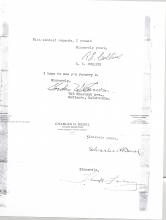
This page displays 4 signatures.
First signature:
With kindest regards, I remain
Sincerely yours,
(R. E. Collins signature here)
R. E. Collins
Second signature:
I hope to see you January 2.
Sincerely,
(Signature of Gordon W. here, last name is unreadable)
749 Chestnut Ave.
Redlands, California.
Third signature:
Charles H. Deuel
State Senator
Sixth District-Butte County
Sincerely yours,
(Charles H. Duel signature here)
Fourth signature:
Sincerely,
(Signature is unreadable)
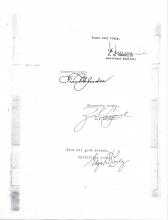
This page displays 4 signatures.
First signature:
Yours very truly
(H. Q. Hammerich signature here)
H. Q. Hammerich
Assistant Auditor.
Second signature:
Sincerely yours,
(Signature here is unreadable)
Third signature:
Sincerely yours,
(Z.S. Leymel signature here)
Z.S. Leymel
Fourth signature:
With all good wishes,
Faithfully yours,
(Edgar C. Levey signature here)

This page displays 4 signatures.
First signature:
Faithfully,
(Signature of Frank is here, last name is not recognizable)
Mr. Arthur A. Ohnimus
Asst. District Attorney,
550 Montgomery Street,
San Francisco, California
Second signature:
Very sincerely yours,
(Signature is not recognizable)
Third signature:
Personal regards,
(Signature of Howard here, the last name is not recognizable)
Fourth signature:
Cordially,
(Julie F. Goss signature here)
Julie F. Goss
Public Information Editor
San Francisco-Oakland Bay Bridge
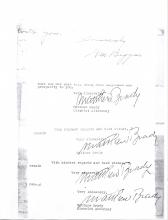
This page displays 1 signature from G.M. Biggar and 4 repetitive signatures from Matthew Brady.
First signature:
Sincerely,
G.M. Biggar
Second item is repetitive signatures of Mathew Brady:
that the new year will bring much happiness and prosperity to you.
Very sincerely,
(Matthew Brady signature is here)
Matthew Brady
District Attorney
With kindest regards and best wishes, I remain
Very sincerely,
(Matthew Brady signature is here)
Matthew Brady
With kindest regards and best wishes, I remain
Very sincerely,
(Matthew Brady signature is here)
Matthew Brady
Very sincerely,
(Matthew Brady signature is here)
Matthew Brady
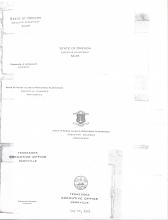
State of Oregon
Executive Department
Salem
State of Oregon
Executive Department
Salem
Charles A. Sprague
Governor
State of Rhode Island & Providence Plantations
Executive Chamber
Providence
(Picture of a shield with an anchor is shown here)
State of Rhode Island & Providence Plantations
Executive Chamber
Providence
Tennessee
Executive Office
Nashville
(Picture of Agriculture Commerce Seal here)
Tennessee
Executive Office
Nashville
May 17, 1941
Prentice Cooper
Governor
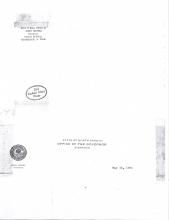
After 5 days, return to
John Moses,
Governor,
Capitol Building,
Bismarck, N. Dak.
Buy Dakota Maid Flour (These words are inside of a circle)
State of North Dakota
Office of the Governor
Bismarck
Picture of Great Seal of the State of North Dakota is shown.
John Moses
Governor

Commonwealth of Virginia
Governor’s Office
Richmond
An image of a man stepping on a man on the ground is shown. In the image it reads: Virginia Sic Semper Tyrannis.
Commonwealth of Virginia
Governor’s Office
Richmond
May 16, 1941
State of Washington
Office of the Governor
Olympia
Picture of “The Seal of the State of Washington 1889”
State of Washington
Executive Department
Olympia
May 14, 1941
Arthur B. Langlie
Governor
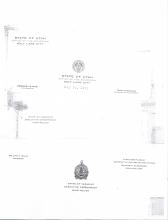
State of Utah
Office of the Governor
Salt Lake City
Picture of “The Great Seal of the State of Utah 1869” is here
State of Utah
Office of the Governor
Salt Lake City
May 16, 1941
Tracy R. Welling
Secretary to the Governor
Herbert B. Maw
Governor
State of Vermont
Executive Department
Montpelier
William H. Wills
Governor
Fletcher Plumley
Secretary of Civil and Military Affairs
William R. McFeeters
Executive Clerk
Picture of a Pine Tree with a background is shown here
State of Vermont
Executive Department
Montpelier

State of New York
Executive Chamber
Albany
An image here of two women standing next to a shield
State of New York
Executive Chamber
Albany
Walter T. Brown
Secretary to the Governors
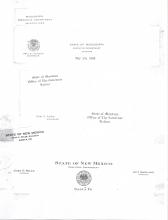
Mississippi
Executive Department
Jackson, Miss.
A picture of an Eagle with decorative banner is here.
Paul B. Johnson
Governor
State of Mississippi
Executive Department
Jackson
May 19, 1941
State of Montana
Office of The Governor
Helena
Sam C. Ford Governor
State of Montana
Office of The Governor
Helena
State of New Mexico
John E. Miles, Governor
Santa Fe
John E. Mills
Governor
State of New Mexico
Executive Department
Picture of the “Great Seal of the State of New Mexico 1912” is here.
Santa Fe
Guy Shephard
Secretary
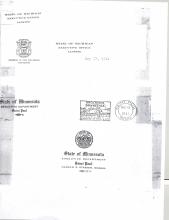
State of Michigan
Executive Office
Lansing
Image of 2 elks and an eagle with a background is shown here.
Murray D. Van Wagoner
Governor
State of Michigan
Executive Office
Lansing
May 17, 1941
State of Minnesota
Executive Department
Saint Paul
Picture of 2 men in a boat fishing is displayed here. The picture also says “Vacation in Minnesota. Land of 10,000 Lakes.”
Picture of a circular stamp that reads: Saint Pau Minn. May 19 1941
A circular image that reads the State of Minnesota and an image of people working at a farm.
State of Minnesota
Executive Department
Saint Paul
Harold E. Stassen, Governor
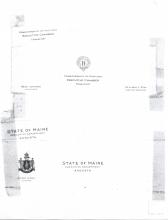
Commonwealth of Kentucky
Executive Chamber
Frankfort
A circular image shown here that reads “Commonwealth of Kentucky.”
Commonwealth of Kentucky
Executive Chamber
Frankfort
Keen Johnson
Governor
Zellner L. Peal
Executive Secretary
State of Main
Executive Department
Augusta
An image of a crest with the words Maine.
Sumner Sewall
Governor
State of Maine
Executive Department
Augusta
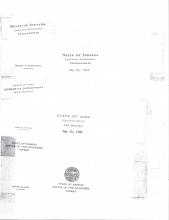
State of Indiana
Executive Department
Indianapolis
State of Indiana
Executive Department
Indianapolis
May 16, 1941
Henry F. Schricker
Governor
State of Iowa
Executive Department
Des Moines
State of Iowa
Executive Office
Des Moines
May 15, 1941
Geo A. Wilson
Governor
State of Kansas
Office of the Governor
Topeka
Picture of a Seal shown here
State of Kansas
Office of the Governor
Topeka
Payne Ratner
Governor
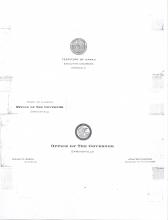
Territory of Hawaii Seal image here
Territory of Hawaii
Executive Chambers
Honolulu
State of Illinois
Office of the Governor
Springfield
A Seal image shown here
Office of the Governor
Springfield
Dwight H. Green
Governor
John Wm. Chapman
Secretary to the Governor
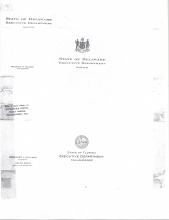
State of Delaware
Executive Department
Dover
Image of a Crest shown here
State of Delaware
Executive Department
Dover
Walter W. Bacon
Governor
After 5 days, return to
Governor’s Office,
Capitol Building,
Tallahassee, Fla.
Great Seal of the State of Florida picture here
State of Florida
Executive Department
Tallahassee
Spessard L. Holland
Governor
Ralph Davis
Executive Secretary
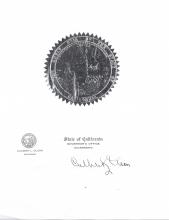
A sticker of a seal of the Great State of California is placed here.
State of California
Governor’s Office
Sacramento
Seal of California Image
Culbert L. Olson
Governor
Culbert L. Olson Signature here
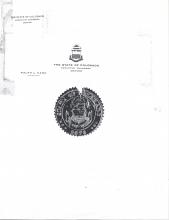
The State of Colorado
Executive Chambers
Denver
A stamp symbolizing the State of Colorado
The State of Colorado
Executive Chambers
Denver
Ralph L. Carr
Governor
The 1876 State of Colorado Seal Sticker is here.
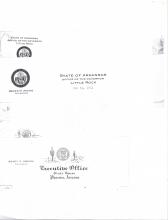
State of Arkansas
Office of the Governor
Little Rock
An image of the Seal of Arkansas is shown here.
An image of the Seal of Arkansas is shown here.
Homer M. Adkins
Governor
State of Arkansas
Office of the Governor
Little Rock
May 21, 1941
An image of the Great Seal of Arizona is here.
Sidney P. Osborn
Governor
An image of the Great Seal of Arizona is here
Executive Office
State house
Phoenix, Arizona
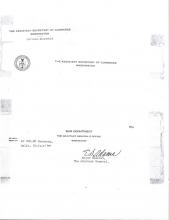
The Assistant Secretary of Commerce
Washington
Official Business
Shield of Department of Commerce is shown here.
The Assistant Secretary of Commerce Washington
ESA
War Department
The Adjutant General’s Office
Washington
In Reply
Refer to
AG 580.82 Corcoran,
Calif. (5-14-41)MO
Signature of E. S. Adams is shown here
Major General
The Adjutant General
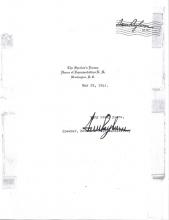
A stamp image is shown here it reads: Sam Rayburn M.C.
The Speaker’s Rooms
House of Representatives H.S.
Washington D.C.
May 22, 1941
Very truly yours,
Sam Rayburn signature here
Speaker, House of Representatives
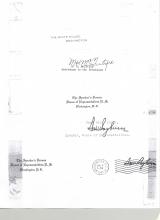
The White House
Washington
M. H. McIntyre Signature here
M. H. McIntyre
Secretary to the President
The Speaker’s Rooms
House of Representatives H.S.
Washington D.C.
Very truly yours,
Saw Rayburns Signature here
Speaker, House of Representative
The Speaker’s Rooms
House of Representatives H.S.
Washington D.C.
Circular stamp image shown here it reads: Washington D.C. 1941 Apr 3 7-PM
A stamp image is shown here it reads: Sam Rayburn M.C.
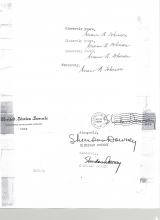
Sincerely yours,
(First name of signature is not readable but last name is Johnson)
Sincerely yours,
(First name of signature is not readable but last name is Johnson)
Sincerely yours,
(First name of signature is not readable but last name is Johnson)
Sincerely,
(First name of signature is not readable but last name is Johnson)
A circular stamp is shown here it reads: Washington D.C. 1941. Jul 10 7:30 PM. Another stamp is shown next to it that reads: Sheridan Downey.
Sincerely,
Signature of Sheridan Downey is here
Sheridan Downey
Sincerely,
Signature of Sheridan Downey is here
Sheridan Downey
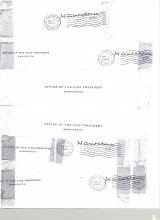
A circular stamp is shown here it reads: Washington D.C. 26 1941. May 29 7:30 PM. Another stamp is shown next to it that reads: H. A. Wallace V.P.
Office of the Vice President
Washington
A circular stamp is shown here it reads: Washington D.C. 15 1947. May 1 6:30 PM. Another stamp is shown next to it that reads: H. A. Wallace V.P.
Office of the Vice President
Washington
Office of the Vice President
Washington
Office of the Vice President
Washington
A circular stamp is shown here it reads: Washington D.C. 8 1947. May 26 7:30 PM. Another stamp is shown next to it that reads: H. A. Wallace V.P.
Office of the Vice President
Washington
A circular stamp is shown here it reads: Washington D.C. 24 1947. July 9 6:30 PM. Another stamp is shown next to it that reads: H. A. Wallace V.P.
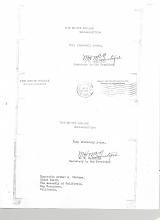
The White House
Washington
Very sincerely yours,
M. H. McIntyre signature here
M. H. McIntyre
Secretary to the President
The White House
Official Business
A circular stamp is shown here it reads: Washington D.C. 7 1941. Jul 8 9-PM. Another stamp is shown next to it that reads: PENALTY FOR PRIVE USE TO AVOID PAYMENT OF POSTAGE $300
The White House
Washington
Very sincerely yours,
M. H. McIntyre signature here
M. H. McIntyre
Secretary to the President
Honorable Arthur A. Ohnimus,
Chief Clerk,
The Assembly of California,
San Francisco,
California.
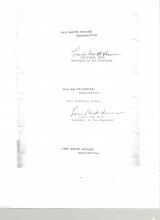
The White House
Washington
Louis McH. Howe signature is shown here
Louis McH. Howe
Secretary to the President
The White House
Washington
Very sincerely yours,
Louis McH. Howe signature is shown here
Louis McH. Howe
Secretary to the President
The White House
Washington
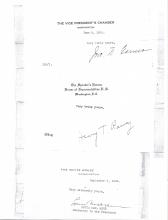
The Vice President’s Chamber
Washington
June 5, 1933.
Very truly yours,
(Signature here is un-recognizable)
JNG/1.
The Speaker’s Rooms
House of Representatives U.S.
Washington D.C.
Very truly yours,
Signature of Harry T. is shown here, the last name is not unreadable
HTR:g
The White House
Washington
September 6, 1933
Very sincerely yours,
Signature of Louis McH. Howe is shown here
Louis McH. Howe
Secretary to the President
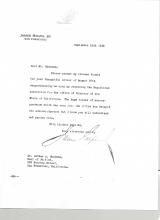
James Rolph, Jr.
San Francisco
September 12th 1930
Dear Mr. Ohnimus,
Please accept my sincere thanks for your thoughtful letter of August 27th congratulating me upon my receiving the Republican nomination for the office of Governor of the State of California. The huge volume of correspondence which has come into the office has delayed the acknowledgement but I know you will understand and pardon this.
With kindest regards,
Very sincerely yours,
James Rolph Jr. signature here
Mr. Arthur A. Ohnimus,
Hall of Justice,
333 Kearney Street,
San Francisco, California.

Handwritten note: Hanford Journal 8/11/44
Newspaper clipping reads:
Peace Officers to Hear Guest Speaker
The Kings County Peace Officers’ association is to hear a talk Thursday evening by Arthur Ohnimus, deputy attorney general, who will speak on the newly organized “Little FBI.” Two films, one depicting commando training, the other pistol shooting, will be projected.
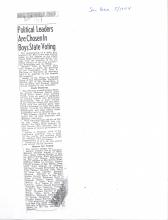
Handwritten note: Sac Bee 5/1944
Newspaper clipping reads:
Political Leaders are Chosen in Boys State Voting
The organization of a state government for Boys State was started today on the campus of the Grant Union High School and Junior College with the selection of the political leaders of the rival parties-the Federalists and the Whigs.
Michael Titus of Beverley Hills was chosen to guide the destinies of the Federalists, with John R. Sullivan of Monrovia as secretary and C. D. Aseltine of Los Angeles as counselor.
Leader of the Whigs is Richard Lyon of San Bernardino. Benjamin Foster, also of San Bernardino, is the secretary and Norman Dunbar of Los Angeles is the counselor.
Draft Platforms
The 750 boys attending Boys State, an annual American Legion sponsored event which gives selected youths from all parts of California a working insight into democratic government, was to move toward a pre-election climax late this afternoon with the political party committee meetings to draft their platforms. At 8:30, the Whigs and the Federalists will hold rallies when candidates will be introduced.
The primary election of state officers will be held tomorrow and Monday afternoon.
With the municipal officers of the 21 tent “cities” selected late yesterday, the Boys State citizenry today turned their attention also to the choice of county government officers.
Arthur A. Ohnimus, clerk of the California Assembly, was a guest of the youths this morning when he offered them instruction in the organization of city courts.
Tomorrow at 11 A.M., the youths will attend church services.
Mayors are named
The mayors are chosen are:
Donner, Donald Cox of Glendale; Bidwell, Thomas August of Whittier; Judas, Charles Krause of Chico, Butte County; Mills, Harold Gill of San Luis Obispo; Huntington, Robert Stetson of Elk Grove; Sloat, Edward Miller of Corona; Carson, James Tanner of San Mateo; Stanford, Kent Bullock of Oakland; Marshall, Donald Prestridge of San Luis Obispo; Burnett, Otto Ploetz of West Los Angeles; Fremont, William Marlowe of Millbrae; Sutter, Dennis Miller of San Francisco; Crocker, Raymond Stock of Redondo Beach; Larkin, Charles Metton of Santa Rosa, Sonoma County; Pico, James E. Hines of Tujunga; Smith, Harold Segerstrom of Santa Ana; Kearney, Verne E. potter of San Bernardino; Fillmore, Richard Davison of El Segundo; Muir, Davis Burnett of Whittier; Burbank, Edwin Oliveira of Arcata, Humboldt County, and Jordon, James Roberts of Alameda.
City attorneys, police judge, police and fire chiefs were appointed and city ordinances were being prepared by the city attorneys for adoption.
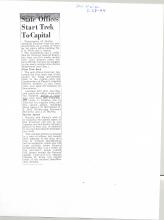
Handwritten note: Sac union 3-28-44
Newspaper clipping reads:
State Offices Start Trek to Capitol
“Department of Justice….Criminal Division” read the new inscriptions on a series of doors in the state’s office building No. 1 at Ninth and L Streets.
The inspections add a credit line for Attorney General Kenny, but they are five weeks premature, since Kenny’s office will not official become the kingpin in the newly created state justice department until May 1.
First Trek Back
The new offices, however, represent the first small trek of the state’s far flung government back to the capital-with the headquarters of Kenny’s criminal bureau, formerly in San Francisco, now open for business in Sacramento.
Assistant Atty. Gen. Jess Hession heads the office, along with two deputies, Arthur A. Ohnimus, here from San Francisco, and Lewis V. Drucker, due in from the Los Angeles office; and five special agents, including Chief Agent J. H. McClelland, E. F. Dilts, Willkie Ogg, Raymond McCarthy and J. H. Mulvey.
Special Agents
Hession and Kenny’s plan is to maintain one special agent in San Francisco and two in Los Angeles, and one deputy attorney general in each city, in addition to the new Sacramento headquarters staff.
The criminal division is located in a suite of offices, just remodeled, adjacent to the state division of criminal identification and investigation, which also will come partially under Kenny’s jurisdiction May 1 as a result of the governor’s prison reform bill passed during the January special legislative session. Charles H. Stone will remain chief of the criminal identification division.
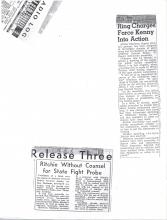
This page displays 2 newspaper clipping.
First newspaper clipping reads:
Ring Charges Force Kenny into Action
Arthur Ohnimus, deputy attorney general, has been assigned to investigate charges of gambling and crookedness in boxing, Attorney General Robert W. Kenny announced yesterday.
Ohnimus said he intends to attend a meeting of the assembly public morals committee March 9 in Los Angeles, when a hearing will be made by Willie Ritchie, chief boxing inspector of the state athletic commission.
“I will sit as an interested observer at the committee hearing,” Ohnimus said. “if anything is brought out warranting action by the attorney general’s office, I will report it to Attorney General Kenny.
“In the meantime, this office will receive, as always, any bona fide charges or affidavits on fixed fights on crookedness in the boxing game.”
In a letter by Ritchie, made public yesterday by Joseph Genshlea, boxing commission secretary, it was charged that there has been widespread gambling on California boxing contests and that gamblers in some instances have fixed bouts.
Ritchie previously had made similar accusations verbally to the commission, which requested him to put his statements in writing.
Besides gambling charges, Ritchie also asserted:
Referees, managers and matchmakers have been permitted to ignore rules and regulations, “have frequently belittled the commission and its officials, and have insulted them, without being disciplined or called to account.”
Second newspaper clipping reads:
Ritchie without Counsel for State Fight Probe
Possibility of a hitch over the status of Attorney General Robert Kenny’s deputy, Arthur Ohnimus, developed yesterday, with the morals committee boxing investigation scheduled to being here Thursday morning.
It has been generally expected that Ohnimus, who has arrived from Sacramento, would serve, more or less, as Chief Inspector Willie Ritchie’s counsel, as well as being the Attorney General’s observer.
However, Ohnimus, revealed in a powwow with Ritchie, whose charges along with those of Assemblyman John Evans will be probed, that he will be strictly an observer. This was not entirely to the satisfaction of Ritchie who has requested counsel.
The new controversy will be thrown into the lap of Harold Sawallish, morals committee chairman, when he arrives this morning.
Sawallish, already advised of Ritchie’s wishes, so far as shown no disposition to make any move to satisfy them.
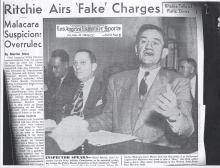
*Words that are unreadable will be replaced by two asterisks.
Los Angeles Examiner Sports
Fri., Mar 10, 1944 PCC - Part II, Page 5
Ritchie Airs ‘Fake’ Charges
Ritchie Tells of Fistic ‘Dives’
Malacara Suspicions Overruled
By Morton Moss
Chief Inspector Willie’s Ritchie’s recommendation that the purses be held up after the Carlos Malacara-Jerry Moore Legion purported fake last December 3 was overruled by Commissioner Tony Entenza and former Commissioner Everett Sanders, it was disclosed yesterday when the Public Morals Committee boxing investigation began in the State Building.
Following an agreement to lift Assemblyman John Evans’ charges prior to Ritchie’s, Match-maker Charley MacDonald of the Legion, Ditchie and former commissioner Sanders were called in that order by Evans for questioning on the Hollywood bout which ended with suspicious of fakery in the air.
Sudden Odds Switch
Ritchie revealed that Inspector Carl Gerard told him before the bout that there were rumors Malacara was going to “dive” and there had been a sudden switch in the odds to Moore. Willie, according to his story, sent Gerard to inform Sanders.
Sanders stated he warned Malacara it was a felony to fake a fight in California and elicited a denial from Carlos that he been “fixed” by a gambler. Sanders then asserted that he explained the situation to Referee Abe Roth and suggested that he caution the contestants.
Sanders disagreed with Ritchie… *the bottom of this newspaper clipping is cut off.
There is an image of 3 men shown in the newspaper but the identity of the men isn’t clearly stated.
Inspector Speaks-Willie Ritchie, chief inspector for the State Athletic Commission, as he appeared yesterday before the Public Morals Committee to hurl charges of “fixed” fights. Here, Ritchie reveals that he heard rumors before the Carlos Malacara-Jerry Moore bout last December 3 at Hollywood Legion that Malacara was going to take a “dive.” Abe Roth called bout a draw. Also under investigation is the Watson Jones, Ernie Rios Olympic fight.
- Los Angeles Examiner photo.
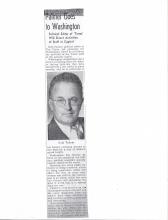
Palmer Goes to Washington
Political Editor of ‘Times’ will Direct Activities of Staff in Capital
Kyle Palmer, political editor of The Times, left yesterday for Washington, where he will direct the activities of the Times’ staff in the national capital.
Washington assignments have been a recurring chore for Palmer during intervals that have lasted from a few weeks to many months, and he is returning to his former stamping ground at this time for a stay of undetermined length.
(An image of Kyle Palmer is shown here)
Washington has become by force of circumstances the military, political, economic and diplomatic capital of the world.
Decisions are being made, authority is being conferred, action is being undertaken which will affect the lives of every man, woman and child in the country, and to an extent which few now can discern will determine the kind of world that is to emerge from the war.
Palmer’s comments on the Washington scene in the past and his news dispatches from the capital have been informative and accurate as well as pertinent and interesting.
Possessing both a reporter’s instinct and an observer’s discrimination, he will reflect for the readers of The Times a true and day-to-day picture of men and events as they appear and occur.
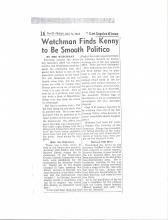
16 Part II-Friday, Jan 14, 1944 Los Angeles Times
Watchman Finds Kenny to be Smooth Politico
By the Watchman
Prowling around the Attorney General’s office via remote control, the Watchman confirms again his conclusion that the genial Bob Kenny is one of the smoothest politicos in the State. We will fulminate on this at length some time, but for the nonce we wish to remark that Kenny puts on an air of naiveté-but it is only an air. Fact is that he is a political wolf who can work a flock of Republican sheep over any time he wants to, seemingly.
But that is another story. For the time being we will pitch him in another role. He is one who practices what he preaches as to smart politics in his own party-the Democratic. Oh, didn’t you know that Bob was a Democrat? The other night Kenny told the Hollywood Democratic Club that over-the-back-fence neighborhood rows had and would hurt the party. Good advice for any party.
Both are Diplomats
There was a time when in 1942 in the Democratic primary, Attorney Carl Kegley and State Senator Kenny sought the endorsement of the Democratic County Central Committee when both were candidates for the nomination for Attorney General. Kenny got it, but Kegley charged in open meeting that Kenny secured it through misrepresentation of his floor leader and that the endorsement was “brought.” In October, however, Kegley issued a statement urging all toe support “my friend, Bob Kenny, as eminently qualified.”
It has just been disclosed that Kegley has been appointed Deputy Attorney General by Kenny, working out of the Los Angeles office. They are both diplomats!
Now indications are that Political Wolf Kenny may be planning a raid on the legislative sheep. He not only has appointed Chief Clerk of the Assembly, able Arthur Ohnimus, to the post of Deputy Attorney General, but he has, it is disclosed, given Chief Sergeant-at-Arms of the Assembly Willkie Ogg of Sacramento a job as confidential investigator for the Attorney General.
(Ogg is at present reported to be working over one of the San Joaquin Valley cities because of Army complaints about naughty girls.)
Ohnimus had been for years a Deputy City Attorney for San Francisco. Kenny has precedent for hiring attaches of the Legislature for his staff. Other departments or boards have their people on the attaches’ roles.
Mattoon Still Here
Concluding the prowl on the Attorney General’s beat, we find that, contrary to earlier reports, Everett Mattoon, former chief of the Los Angeles office, has not been transferred to the San Francisco-Sacramento area. He is currently working in the Los Angeles office, having recovered from a siege of the flu. His wife has been ill also. Kenny said that Mattoon, specializing in the alien land law, will work all over the State.
As to the possibility of his being a candidate for the nomination for United States Senator, Kenny laughed and said: “No, I’m no Messiah!”
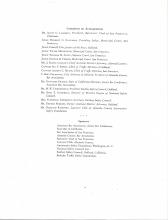
Committee on Arrangements
Mr. Scott C. Lambert, President, Barristers’ Club of San Francisco, Chairman.
Judge Herbert C. Kaufman, Presiding Judge, Municipal Court, San Francisco.
Judge Chris B. Fox, Justice of the Peace, Oakland.
Judge Twain Michelson, Municipal Court, San Francisco.
Judge Thomas M. Foley, Superior Court, San Francisco.
Judge George B. Harris, Municipal Court, San Francisco.
Mr. J. Frank Coakley, Chief Assistant District Attorney, Alameda County.
Captain Ira F. Reddy, Chief of Traffic Division of Oakland.
Captain Albert C. Munn, Chief of Traffic Division, San Francisco.
F. Bert Fernhoff, City Attorney of Oakland, President of Alameda County Bar Association.
Mr. Gunther Detert, State of California Chairman, Junior Bar Conference, American Bar Association.
Mr. M. W. Dobrzensky, President, Eastbay Safety Council, Oakland.
Mr. Earl F. Campbell, Director of Western Region of National Safety Council.
Mrs. Florence Anderson, Secretary, Eastbay Safety Council.
Mr. George Perkins, Former Assistant District Attorney, Oakland.
Mr. Richard Klippert, Lawyers’ Club of Alameda County Automotive Safety Foundation.
Sponsors
American Bar Association, Junior Bar Conference.
State Bar of California
Bar Association of San Francisco.
Alameda County Bar Association.
Barristers’ Club of San Francisco.
Lawyers’ Club, Alameda County.
Automotive Safety Foundation, Washington, D.C.
National Safety Council, Inc.
Eastbay Safety Council, Oakland, California/
Berkeley Traffic Safety Commission.
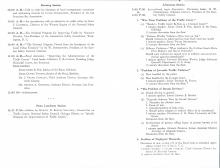
Morning Session
10:00 A.M. - Call to order by chairman of local arrangements committee and welcoming remarks by Lloyd Dinkelspiel, President of the San Francisco Bar Association.
10:05 A.M. - An introductory talk on objective of traffic safety by Earl F. Campbell, Director of the Western Region of the National Safety Council.
10:20 A.M. - The National Program for Improving Traffic by Norman Damon, Vice0President of the Automotive Safety Foundation, Washington, D.C.
10:40 A.M. – “The National Program Viewed from the Standpoint of the Local Urban Territory” by M. W. Dobrzensky, President of the East-bay Safety Council, Oakland.
11:0. A.M. – Panel discussion. “Improving the Administration of the Traffic Courts.” Panel leader: Herbert C. Kaufman, Presiding Judge, Municipal Court, San Francisco.
Panel members:
Judge Chris B. Fox, Justice of the Peace, Oakland.
Judge Oliver Youngs, Justice of the Peace, Berkeley.
Mr. J. Frank Coakley, Chief Assistant District Attorney, Alameda County.
Mr. Arthur A. Ohnimus, Assistant District Attorney, San Francisco.
12:00 P.M. – Adjournment
Noon Luncheon Session
12:15 P.M. – Address by Harvey D. Booth, Secretary, Committee on Traffic Courts, National Safety Council, Chicago, Illinois, on “Specific Proposals for Improvements of Traffic Courts.”
Afternoon Session
2:00 P.M. to 4:30 P.M. Streamlined topic discussions. Discussion leader, M. W. Dobrzensky, Oakland attorney, President of the East Bay Safety Council.
- “War Time Problems of the Traffic Court.”
- “Should a Traffic Court Be Run as a Criminal Court?”
5 minute speaker: Judge Chris B. Fox, Justice of the Peace, Oakland.
15 minute discussion from the floor.
- “Defense Worker Violator-Time Lost on Job”
Should violators be jailed and lose time from vital war work?
5 minute speaker: Judge Twain Michelson.
15 minute discussion on the floor.
- Military Violators-“What Authority Do Civilian Courts Have Over Military and Naval Violators?”
Should such violators be turned over to military and naval correction agencies immediately?
5 minute speaker: CAPTAIN HERBERT WENIG, Judge Advocate General’s Department, U.S. Army.
15 minute discussion from the floor.
- “Problem of Juvenile Traffic Violator.”
- How handled by the police.
- How handled by the Juvenile Court.
5 minute speaker: Judge Thomas M. Foley.
15 minute discussion from the floor.
- “The Problem of Drunk Drivers.”
- Drunk driving in general.
5 minute speaker: Judge George B. Harris.
- “Scientific Sobriety Tests for Drunk Drivers.”
- Necessity for sobriety tests.
- Form of tests.
- Constitutionality of body tests.
- Should police surgeon or medical officer be in attendance?
5 minute speaker: Professor A. M. Kidd, University of California.
Discussion from the floor.
- Involvement of person selling liquor to persons known to be drunk.
5 minute speaker: George Perkins, former Assistant District Attorney of Alameda County.
Discussion from the floor.
- Problem of Negligent Homicide.
Discussion of new section 193 of the Penal Code as amended, superseding section 500 of the C. V. C.
5 minute speaker: J. Frank Coakley, Chief Assistant District Attorney of Alameda County.
15 minute discussion from the floor.
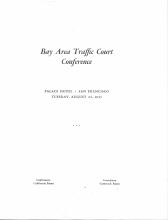
Bay Area Traffic Court Conference
Palace Hotel · San Francisco
Tuesday, August 24, 1943
Conference
California Room
Luncheon
Comstock Room
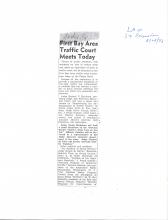
First Bay Area Traffic Court Meets Today
Causes of traffic accidents, with emphasis on how to reduce them and speed up disposition of cases in traffic court, will be discussed at the first Bay Area traffic court conference today at the Palace Hotel.
Purpose of the conference is to provide a constructive discussion of war-time traffic law enforcement, a problem that has become a matter of grave concern affecting the local war effort, the committee announced.
Judge Herbert C. Kaufman, presiding Judge, San Francisco Municipal Court, will lead a panel discussion on “Improving the Administration of Traffic Courts,” in which Judge Chris B. Fox, Oakland; Judge Oliver Youngs, Berkeley; J. Frank Coakley, Chief Assistant District Attorney, Alameda County, and Arthur A. Ohnimus, Assistant District Attorney, San Francisco, will participate.
Judge Twain Michelsen will lead a panel discussion on the “Defense Worker Violator-Time Lost on the Job.” Military violators will be discussed by a representative of the Judge Advocate General’s department of the army. Judge Thomas M. Foley will discuss “Juvenile Traffic Violators.”
Other subjects and speakers:
“The Problem of Drunk Drivers,” Judge George B. Harris; “Scientific Sobriety Tests for Drunk Drivers,” Dean A. M. Kidd, University of California; “Problem of the Negligent Homicide,” J. Frank Coakley; “National Program of Improving Traffic,” Norman Damion, vice president of the Automotive Safety Foundation, Washington, D.C.; “The National Safety Program Viewed from the Standpoint of Local Urban Territory,” M. W. Dobrzensky, president of the East Bay Safety Council, Oakland; “Specific Proposals for Improvements of…*The rest of this newspaper clipping is not shown.
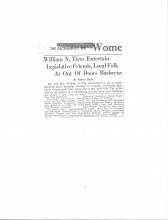
The Sacramento Bee
William N. Tiers Entertain Legislative Friends, Local Folk at Out of Doors Barbecue
By Eleanor Doyle
Mr. and Mrs. William N. Tier entertained at an al fresco barbecue party Saturday evening for a group of visiting legislative friends and their wives and few local folk. The affair was in the nature of a christening for the hosts’ new barbecue and terrace at their home on the Fair Oaks Boulevard.
The supper was served buffet style on the tiled garden patio where informal troubadour music was played by a string trio from Ken Harvey’s orchestra.
The guests were: Assemblymen and Mesdames Charles Lyon, J. G. Crichton; Senator and Mrs. Hugh Burns; Assemblyman Fred Weybret, Harold F. Sawallisch, Walter Fourt; Judge Herbert C. Coffman.
Drs. and Mesdames John Fanning, George Fitzgerald, Messrs. And Mesdames Wilkie Ogg, Earl Behrens, Ben Baxter, Roy Scott: Mrs. John M. Clark; Miss Rae St. Thomas; Captain Harry Albaugh, Lieutenant Rube Albaugh; Messrs. Arthur A. Ohnimus and Arthur Samish.
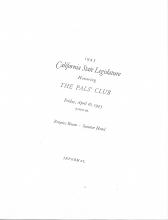
1943
California State Legislature
Honoring
The Pals’ Club
Friday, April 16, 1943
7:00 P.M.
Empire Room – Senator Hotel
Informal
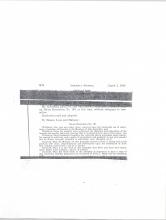
1472 Assembly Journal [April 1, 1943
Resolutions
The following resolutions were offered.
By Mr. Robertson:
Request for Unanimous Consent
Mr. Robertson asked for, and was granted, unanimous consent to take up House Resolution No. 160, at this time, without reference to committee.
Resolution read and adopted.
By Messrs. Lyon and Maloney:
House Resolution No. 161
WHEREAS, One year ago today, there ventured upon the uncharted sea of matrimony a bachelor well known to the Members of this Assembly; and
WHEREAS, Since the nuptials were performed, the digestion and disposition of the benedict has greatly improved, proving that it is dangerous for man to live along; and
WHEREAS, Since becoming a benedict, his voice has shown noticeable improvement, his apparel is well kept, and a smile of contentment and geniality is now ever present and an almost roly-poly rotundity is noticeable; now, therefore, be it
Resolved, That the Members of this Assembly extend to Fred J. Desch and to his gracious wife Jane, congratulations and felicitations upon the celebration of their first wedding anniversary; and be it further
Resolved, That it is the wish of this Assembly that Fred and Jane have many, many happy ears together; and be it further
Resolved, That the Chief Clerk of the Assembly is instructed to have a copy of this resolution suitably prepared to presented to Fred J. Desch and his charming wife.
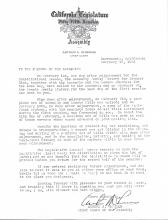
California Legislature
Fifty-Fifth Session
Assembly
Arthur A. Ohnimus
Chief Clerk
Sacramento, California
February 18, 1943
To the Member of the Assembly:
On February 1st, one day after adjournment for the Constitutional Recess, the Assembly Weekly History for January 31st, together with the Assembly and the Senate Journals for the same day, were mailed to the members; and on February 2nd, the Senate Weekly history for the last day of the first session was sent to you.
Nine days after adjournment, on February 9th, a complete set of Assembly and Senate Bills was mailed; and on February 16th, 16 days after adjournment, a copy of the Semi-Final history, with its complete index to all bills introduced during the first session, was forwarded to you. On about the 11th day of February, a complete set of bills was sent to each of those person whose names appeared on your mailing list.
Despite the handicap of present day war conditions, and delays in transportation, a record was established in the printing and mailing of a complete set of bills within nine days after adjournment, and in the compilation, printing, and mailing of the Semi-Final History to each of the members within 16 days after such adjournment.
The Legislative Counsel Bureau expects to have the Legislative Digest ready for distribution on about the 1st of March; and we are hopeful that the Legislative Handbook will be printed before you return for the second half of the session.
If you ordered stationery before adjournment, and desire to have it sent to you at either your office or your home, kindly let me know and I shall be happy to see that it is sent to the place you designate.
Looking forward with pleasure to your return in March, and trusting that if there is anything you want you will write to me, I am, with kindest and best wishes,
Yours sincerely,
Arthur A. Ohnimus Signature here
Arthur A. Ohnimus
Chief Clerk of the Assembly
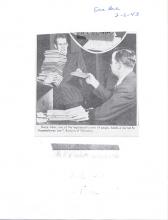
Handwritten Note: Sac Bee 2-6-43
An image is shown here of Bruce Allen handing a journal to Lee T. Bashore. Under the image there is a description it reads: Bruce Allen, one of the legislature’s crew of pages, hands a journal to Assemblyman Lee T. Bashore of Glendora.
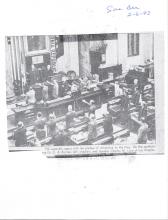
Handwritten note: Sac Bee 2-6-43
An image is shown of an assembly session opening with a pledge of allegiance. There is a description at the bottom of the image it reads: The assembly opens with the pledge of allegiance to the flag. On the platform are Dr. C. A. Kircher, left, chaplain, and Speaker Charles W. Lyon of Los Angeles.
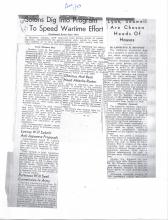
This page displays 3 newspaper clipping.
Newspaper clipping 1 and 2 are overlapping one another so a lot of the content for newspaper clipping 1 is not visible.
First newspaper clipping reads:
Solons Dig Into Program to Speed Wartime Effort
(Continued from Page One)
of Monterey County, GOP state chairman, characterized the governor’s address as “a very excellent… *The rest of this column is not shown.
Second column:
the state greater power of coordinating state action to meet war emergencies with county and city governments.
Second newspaper clipping reads:
First Column:
Lyons Stresses War
Speaker Lyon in his speech of acceptance told the assembly legislation need in the successful prosecution of the war should be uppermost in the consideration of the many bills to come before the legislature this session.
“The first and foremost wartime objective of the members of the legislature and of all city and county governments is to streamline their governmental activities, particularly since the federal government has taken over so many of the functions of the state, county and city governments,” he said. “The terrific tax burdens that are being imposed by the federal government make this necessary.”
He urged that bills involving the state guard and civilian defense be disposed of during the January session and listed as other necessary war time legislation a simplification of birth certificate procedure, a reduction in state taxes and a wartime budget.
“I feel certain,” he said, “better and more constructive legislation will result in our having fewer committees and there will be less duplication of effort. It shall be my endeavor to make this session as short a one as possible, consistent with the enactment of good legislation.”
He recommended special consideration be given to problems of the post war period.
Lowrey Will Submit Anti-Japanese Proposals
Assemblyman Lloyd W. Lowrey of Yolo County said today he has three proposals ready for introduction which are designed to regulate and control Japanese in California.
They include a joint resolution asking congress to declare Japanese holding dual citizenship in Japan to be ineligible for citizenship in the United States, a bill to deny fishing rights to anyone ineligible to United States citizenship and a measure to penalize property owners who rent or sell their property to Japanese who are not citizens of the United States.
Patterson Will Seek Commission in Army
Retiring Lieutenant Governor Ellis E. Patterson announced, immediately after inauguration of his successor, he will leave for Washington D. C., tomorrow in connection with his application for a commission in the army.
Patterson, who will go to the national capital by plane, is seeking appointment to the new army school or military governors which has been established in Virginia.
Second Column (The top of the second column is not shown):
sure, who is beginning his thirty third year as a state law maker. The amendments are expected to be given early consideration as an important part of the war legislation program scheduled for the first half of the session.
The present law does not have sufficient power for war emergency purposes, according to Slater who said he will confer tomorrow or Wednesday with Governor Warren regarding amendments to the statue which he will offer.
Ohnimus and Beck Head Attache Roster
Arthur A. Ohnimus was elected today to preside at the assembly desk as chief clerk and Wilkie Ogg as sergeant at arms while Joseph Beek was selected again to act as the senate’s secretary and Joseph Nolan as the senate sergeant at arms. The four have served in these capacities before, Ohnimus, Beek and Nolan having had exceptionally long records as legislative officers.
The senate also elected John Lee of Roseville as its minute clerk.
Third newspaper clipping reads:
Lyon, Seawell are Chosen Heads of Houses
By Lawrence M. Monfort
The California Legislature dug into a program to speed the war effort, effect economies and reduce taxes today with Governor Earl Warren’s inaugural admonition to forget petty politics and get to work still ringing in its ears. Bills began to grind in the legislative hopper as organization stood practically completed in both houses.
Economy, harmony and planning for the war’s aftermath was the keynote of Governor Warren’s initial speech delivered late yesterday at a joint session to witness the simple inauguration of a new governor. This keynote was echoed by Lieutenant Governor Frederick F. Houser and President Pro Tempore Jerrold L. Seawell of the senate, and by Speaker Charles W. Lyon of the assembly and had the hearty support of Republican and Democratic floor leaders as well.
Chamber Jammed
The assembly chamber, here the inauguration ceremonies were held, was jammed for the occasion. The aisles were filled with chairs and spectators crowded in in such a manner that entrance or exit practically was impossible after the new governor had been ushered into the chamber. The crowd overflowed into the corridor where scores of persons stood on tiptoe, unable to hear but occasionally catching glimpses of the figures on the rostrum.
Warren was given a resounding ovation when he entered the chamber, when he was inaugurated and given the oath of office by Chief Justice Phil S. Gibson of the state supreme court and when he finished his address. Houser also drew generous applause. Chief Justice Gibson administered the oath to Houser after Warren finished talking.
Among the happiest in the crowd were Mrs. Warren and five of the Warren children who applauded as vigorously as anybody and listened carefully to the address given by their husband and father.
Afterward hundreds flocked to the governor’s office and filed through…*the rest of this newspaper clipping is not shown.
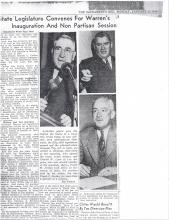
Shown on this page is a newspaper clipping, it is a continuation of another newspaper clipping that is not shown. Words that are unreadable are replaced by two asterisks. Newspaper clipping reads:
State Legislature Convenes for Warren’s Inauguration and Non Partisan Session
(Continued from Page One)
First Column:
to name the chairmen and members of all the other senate committees.
Lyon, who has served in the senate as well as the assembly, first time to the legislature in 1915 and ** second in years of service only ** Democratic Senator Herbert W. Walter, who won election in Sonoma County back in 1910.
Assemblyman Samuel L. Collins of Orange County, former congressman, was chosen Republican floor leader, the job Lyon had last session.
Collins was Lyon’s choice for head of the important rules and house functions committee, with Assemblyman Earl Desmond of Sacramento County in line for the vice chairmanship.
Warren Has Friendly Legislature
Both houses have Republican majorities, apparently assuring Governor Warren of a friendly legislature.
The new administration beings under other auspicious circumstances, too: Production is booming; unemployment is practically on existent; the state budget is balanced, and the treasury general fund surplus, already of record size, as growing steadily.
The party lineup in the assembly totals 44 Republicans and 36 Democrats. The senate figures are 13 Republicans and 16 Democrats, with one seat vacant, that of Republican Senator John Philips of Riverside County, recently elected to congress.
Warren Did not Interfere
Governor Warren left legislative organization strictly up to the law-makers, announcing in advance the ** not intend to meddle in their internal contests.
The minority Democrats, who ** last night to map plans for the session, will have the state chairman of their party, Assemblyman Robertson, as their floor spokesman in the lower house where they are only eight votes behind GOP.
And this year the other house will have the Republican state chairman – Senator Tickle. The upper house regained a former presiding officer, incidentally, when former Republican Lieutenant Governor George J. Hatfield took his seat as the new senator from Merced and Madera Counties.
Attaches are named
There were no quarrels on the horizon over the ranking legislative attaches. On hand in the assembly were Chief Clerk Arthur A. Ohnimus of San Francisco and Sergeant at Arms Wilkie Ogg of Sacramento. And chosen for another term in the senate were the veterans, Secretary Joseph A. Beek of Balboa and Sergeant at Arms Joseph F. Nolan of Los Angeles.
Father Richard C. Dwyer of the Cathedral of the Blessed Sacrament was chosen as the senate chaplain, while Rev. Clarence A. Kircher, pastor of Sacramento’s Westminster Presbyterian Church appeared to be the assembly’s choice for chaplain.
As he prepared to take over the reins of government, without the customary 19 gun inaugural salute and with thumbs down on the idea…*the rest of the first column is cut off.
Second Column:
(An image is shown here of Arthur Ohnimus holding a gavel and speaking into a microphone.)
Description under the picture reads: Activities galore gave the Capitol the bustle of a three ring circus today as new officers were administered their oaths, the fifty fifth legislature opened and the administration changed. Top, left to right, are Arthur A. Ohnimus, chief clerk of the assembly, who opened the lower house session, and Charles W. Lyon of Los Angeles, who was elected speaker of the assembly. Below, Frank M. Jordan took office as secretary of state, the position held by his father, the late Frank C. Jordan, for more than a quart of a century.
Bee Photos.
only is the state’s first chief executive who served in World War I, but he also is one of the few native son governors of recent years, the first, in fact, since James Rolph, Jr. Olson was born in Utah; his predecessor, Frank F. Merriam came from Iowa.
Warren has lived in several sections of California. Born in Los Angeles, March 19, 1891, he went to public school in Bakersfield, attended the University of California in Berkeley (1912; School of Jurisprudence, 1914), and has lived in Oakland since the war. There **
Third column:
(There are two images shown in this column, one of Charles W. Lyon and Frank M. Jordan.)
Robertson called for “harmony” in the legislature and general cooperation in acting on necessary defense measures.
Cities Would Benefit by Tax Diversion Plan
Senator John Harold Swan of Sacramento County announced today he will ask for the legislature to divert…*the rest of this newspaper column is not shown.
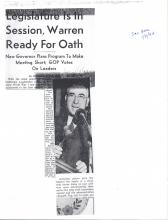
This page displays 2 newspaper clipping that is over lapping one another so a lot of the content of the newspaper clipping is unreadable.
Words that are readable in the first newspaper clipping, reads:
Legislature is in Session, Warren Ready for Oath
New Governor Plans Program to Make Meeting Short; GOP Votes on Leaders
Second newspaper clipping shows a picture of Arthur holding a gavel and speaking into a microphone. There is a description underneath the image it reads:
Activities galore gave the Capitol the bustle of a three ring circus today as new officers were administered their oaths, the fifty fifth legislature opened and the administration changed. Top, left to right, are Arthur A. Ohnimus, chief clerk of the assembly, who opened the lower house session, and Charles W. Lyon of Los Angeles, who was elected speaker of the assembly. Below, Frank M. Jordan took office as secretary of state, the position held by his father, the late Frank C. Jordan, for more than a quart of a century.
Bee Photos.

Assembly Committee Meeting Notice
Mr. Thorp
The Committee on MILITARY AFFAIRS will meet in Room 431 State Capitol on May 1, at 11 A.M. at which the following Bill(s) will be heard: A.B. 420
Cecil King, Chairman

This page displays a title that reads: Read These Lines. Under the title there are vertical and horizontal lines. Some of the vertical and horizontal lines overlap on another. There are also little marks on the lines, might be an indication of some type of meaning.
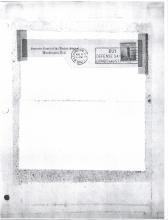
Supreme Court of the United States
Washington D.C.
First Stamp: Washington D.C. 1 1941 Aug 9 4 PM
Second Stamp: Buy Defense Saving Bonds and Stamps
Third Stamp is a postage stamp that reads: United State of America. Security Education Conservation Health for Defense Postal, 3 Cents.
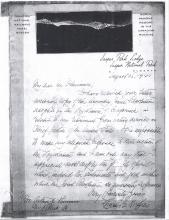
This page displays a handwritten letter written by Charles E. Hughes. Words that are unreadable will be replaced by two asterisks. Below is the letter:
CANDIAN NATIONAL RAILWAYS HOTEL SYSTEM
Top of the letter shows an image of a mountain
WORLD FAMOUS RESORT IN THE CANADIAN ROCKIES
Jasper Park Lodge
Jasper National Park
ALBERTA
August 15, 1941
My dear Mr. Ohnimus;
I have received your letter enclosing copy of the Assembly Joint Resolution adopted by the Legislature of California in relation to my retirement from active service as Chief Justice of the United States. It is impossible to make any adequate response to this action of his legislature and I can only say that I appreciate most ** the friendly spirit which inspired the sentiments and ** wishes which ** Joint Resolution so generously expressed.
Very sincerely yours,
Charles E. Hughes
Attn: Arthur E. Ohnimus
Chief Clerk
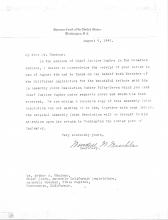
Supreme Court of the United States
Washington D.C.
August 9, 1941
My dear Mr. Ohnimus:
In the absences of Chief Justice Hughes in the Canadian Rockies, I desire to acknowledge the receipt of your letter to him of August 4th and to thank on his behalf both Branches of the California Legislature for the beautiful tribute paid him in Assembly Joint Resolution Number Fifty-Seven which you sent Chief Justice Hughes under separate cover and which has been received. We are making a complete copy of this Assembly Joint Resolution and are sending it to him, together with your letter. The original Assembly Joint Resolution will be brought to his attention upon his return to Washington the latter part of September.
Very sincerely yours,
Signature here unreadable
Secretary.
Mr. Arthur A. Ohnimus,
Chief Clerk, Assembly California legislature,
Assembly Chamber, State Capitol,
Sacramento, California.
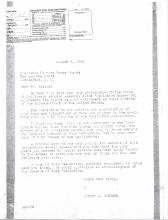
Shown here is a receipt for insured mail from the post office.
August 4, 1941
Honorable Charles Evans Hughes
The Supreme Court
Washington, D.C.
Dear Mr. Hughes:
On June 7 of this year the Legislature of the State of California adopted Assembly Joint Resolution Number 57, expressing its regret at your retirement as Chief Justice of the Supreme Court of the United States.
The Resolution in recognition and appreciation of your long and illustrious service was adopted by the unanimous vote of both Branches of the California Legislature.
I might add that which is not contained in the Resolution and say that the most highly eulogistic words were spoken of your brilliant career, not only by those members who were the authors of this Resolution, but by many members of both Houses of the Legislature.
A tribute such as was paid you by the members of this Legislature should indeed make you feel that the long years you devoted to public service have been amply repaid in the esteem in which you are held by those who know and recognize your work.
A copy of this Resolution, suitably engrossed, is being sent you today. We would appreciate an acknowledgement of this receipt of this resolution.
Yours very truly,
Arthur A. Ohnimus
AAO: IM
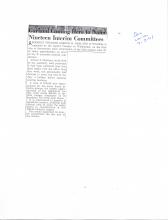
Garland Coming Here to Name Nineteen Interim Committees
ASSEMBLY SPEAKER GORDON H. GARLAND of Woodlake is expected at the capitol Tuesday or Wednesday, on his first trip to Sacramento since termination of the 54th session June 16, to make appointments on most of the 19 assembly interim committees.
Arthur A. Ohnimus, chief clerk of the assembly, said yesterday it had been indicated that Garland might visits his office here this week, but presumably had decided to await the end of the July 4 holiday before opening interim business.
A total of $74,050 was appropriation of the legislature for this work being $40,000 for the joint budget committee of 10 members, five from each house.
It is empowered to appoint a legislative auditor, technical and clerical help to assist the legislature in consideration of the 1943-45 biennial budget.
The senate appointed its interim committees the last day of the session.
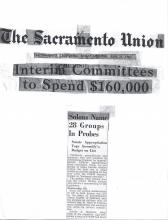
The Sacramento Union
SACRAMENTO, CALIFORNIA, FRIDAY MORNING, JUNE 27, 1941.
Interim Committees Spend $160,000
Solons Name 28 Groups in Probes
Senate Appropriation Tops Assembly’s; Budget on List
California assemblymen and senators, who will comprise 28 committees financed by approximately $160,000 appropriated from contingent funds, are expected to begin interim studies within the next two or three weeks on matters ranging all the way from the 1943-45 biennial budget to “economic security.”
The groups were created during the recent 160-day session and call for a membership of 153 legislators.
Membership Cut
Since the normal membership of 120 in both houses was cut by the death of Assemblyman James Cassidy of Oakland, and the absence on military duty of Senator Ray W. Hays of Fresno, many assemblymen and senators will server on several committees.
Arthur A. Ohnimus, chief of the assembly, said yesterday a total of $74,050 had been…*the rest of this newspaper clipping is not shown.
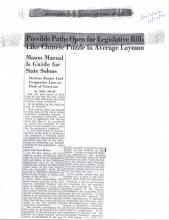
THE SACRAMENTO UNION, SUNDAY MORNING, APRIL 27, 1941
Possible Paths Open for Legislative Bills like Chinese puzzle to Average Layman
Mason Manual is Guide for State Solons
Devious Routes Lead Prospective Laws to Desk of Governor
By Neil Shaw
First column:
Did you ever travel to Redding by the way of Lodi-using all the main highways and little country roads available?
Or to Antioch in the delta by way of Truckee?
If you have, then you gained a faint idea of the many roads, bypasses, overheads, tunnels-and sometimes cow-trails, over which a legislative bill travels from the time it is introduced in either the assembly or the senate to the moment it is ready for the governor’s signature.
If you don’t think a prospective law of the state of California can negotiate a veritable maze of legislative thoroughfares, just question any one of the thousands of interested bu puzzled visitors to the legislature session.
Just Ask Paul Mason
Or, for that matter, ask Paul Mason, author of Mason’s Manual, the last word in parliamentary procedure in the California legislature-that is, of course, outside the regular standing and joint rules of the two houses. Or ask Assembly Chief Clerk Arthur A. Ohnimus, Secretary of the Senate Joseph A. Beck, and some of the others.
Even those responsible with enforcement of rules in the two houses, Assembly Speaker Gordon H. Garland, or Lieut. Gov. Ellis E. Patterson, president of the senate, will tell you its all a pretty complicated business. But there it is-procedure that was set up long ago by the constitution, the statues, rules and joint rules of the two houses, and numerous precedents.
The possible movements of a bill from its introduction in the assembly to the governor’s desk follow the same relative movements if introduced in the senate…*the rest of this column is not shown.
Second column, it only shows the last half, the first half is not shown:
in the assembly is passed by this house, it goes directly to the senate. Its title is read and then it is referred to the proper standing committee there by the committee on rules. When this is done, the measure goes through exactly the same process as it did in the house where it was introduced-debate and all just before the final roll call.
If the senate passes the assembly bill, it goes to the governor’s desk, read for signature.
However, if the senate amends the assembly bill, the measure must be returned to the assembly, where, if the senate amendments are approved, it is ready for the governor. If the assembly does not approve of senate amendments, it appoints a committee on conference, notifies the upper house, which also names a conference committee to discuss the disagreements and attempt a compromise. If an agreement is reached, and the committee’s findings approved by both houses, it is ready for…*the rest of this column is not shown.
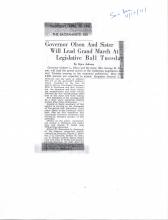
THURSDAY, APRIL 17, 1941
THE SACRAMENTO BEE
Governor Olson and Sister will Lead Grand March at Legislative Ball Tuesday
By Myra Johnson
Governor Culbert L. Olson and his sister, Mrs. George M. Hanson, will lead the grand march at the California Legislative Ball next Tuesday evening in the memorial auditorium. More than 3,000 persons are expected to attend. Brigadier General J. O. Donovan and his staff of officers will act as the governor’s military escort. Included in the line of march will be Lieutenant Governor Ellis E. Patterson and Mrs. Patterson, the senators and their wives, the assemblymen and their wives, followed by the constitutional officers of the state and their wives.
The highlight of the evening will be a floor show featuring motion pictures stars from Hollywood.
Joseph A. Beek, secretary of the senate, is serving as the chairman of the active all committee. Governor Olson is the honorary chairman. Also on this committee are Lieutenant Governor Patterson and Gordon H. Garland, speaker of the assembly.
Others on the active committee are Arthur A. Ohnimus, vice chairman and Joseph F. Nolan and Wilkie Ogg, directors.
Alfred W. Robertson is chairman of the finance committee which consists of Senators Harold J. Powers, J. C. Garrison, Robert W. Kenny, E. George Luckey, Harry Parkman and John D. Foley and Assemblymen Harrison W. Call, Earl D. Desmond, Charles W. Lyon, Thomas A. Maloney, Harold F. Sawallisch and Roger A. Plaff.
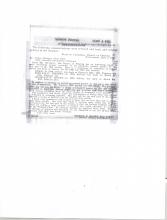
Assembly Journal [April 4, 1941
COMMUNICATIONS
The following communications were received and read, and ordered printed in the Journal:
State of California, Bureau of Printing
Sacramento, April 3, 1941
Mr. Arthur Ohnimus, Chief Clerk
State Assembly, Sacramento, California
Dear Mr. Ohnimus: The Bureau of Printing has an interesting report to make concerning prompt execution of all legislative printed matter for the first part of the 1941 session. Here is a comparison of completion of printed matter and dates of delivery for the 1939 and 1941 first sessions:
BILLS-In 1939, delivery was made on February 16th; 1941 February 8th.
SEMI-FINAL HISTORY-In 1939, delivery was made on March 2d; 1941, February 7th.
LEGISLATIVE DIGEST-In 1939, delivery was made on March 6th; 1941 February 21st.
In addition to speeding up service eon printed matter, we also set a new record in cost of operations. The January, 1939, payroll was $83,188.08-a saving of $1,512.27 despite the fact that we were compelled to work two 12-hour shifts and pay overtime eight hours every day. Both sessions presented about the same number of documents to be printed.
The Legislative Bill Room, under the management of Ewing Hass, also showed a reduction in operating expenses. The pay roll for the first part of the session reflected a saving of $435.21 over the previous first session.
I know your committees will be glad to know that we have been able to accomplish these records. One item that tends to increase costs, which may be more pronounced for the last part of the session, is that the Defense Program and the draft are calling a large number of workers who would otherwise be available for the Printing Plant. In previous sessions we employed three shifts. Because of shortage of printers and pressmen, we are compelled to use two 12-hours shifts and pay each shift four hours’ over time.
GEORGE II. MOORE, State Printer
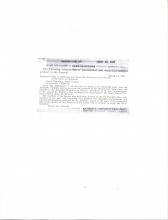
Senate Journal [Mar. 14, 1941
COMMUNICATIONS
The following communication was received and read, and ordered printed in the Journal:
March 14, 1941
Honorable Ellis E. Patterson and Honorable Members of the Senate of the State of California
Senate Chambers, State Capitol
Sacramento, California
Dear Mr. President: I am directed to inform your honorable body that the Assembly cordially invites you and the members of the Senate and their wives and families to the Assembly Chambers on Monday, March 17, at 11 a.m., to participate in the annual St. Patrick’s Day celebration to commemorate the Feast Day of Ireland’s Patron Saint, St. Patrick.
The members of the Senate who have been present at the St. Patrick’s Day celebrations in the past will remember with pleasure the splendid entertainment and educational program presented by the Assembly, and it is the hope of the committee that each members of the Senate and his family will be present to enjoy the entertainment.
Yours very sincerely,
ARTHUR A. OHNIMUS, Chief Clerk
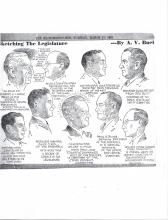
THE SACRAMENTO BEE, TUESDAY, MARCH 11, 1941
Sketching The Legislature --By A. V. Buel
This page shows an illustrated comic picture of 9 men. It is drawn only showing the sides of each man’s face. Under each drawing is a description.
Starting from the top from left to right:
- “They say I resemble Old Allen G. Thurman he wasn’t much for looks”
And I’m agin the reds.
“No spur Jim” Senator J. I. Wagy, Back in the Saddle, is Chairman of Natural Resources Committee, J. I. W. Homeports in Maricopa.
- Allen G. “Scoop” Thurman representing ten counties in the Assembly, head of the mines and mining comm.
- Assemblyman Hugh P. Donnelly, Democrat from Stanislaus, Author of the Anti-Lobbying Bill.
- Senator D. Jack Metzger from Red Bluff, Chairman of the Public Health and Safety Committee.
Bottom row from left to right:
- Assemblyman John D. Welch from San Francisco, would reclaim San Francisco’s Tide Land.
- Arthur A. Ohnimus, Chief Clerk of the Assembly, with more than a decade of service in the legislature.
- Assemblyman William H. Poole from Bell, most “colorful” lawmaker west of the Rockies, is chairman of the crime problem committee.
- Paul A. Richie, Serving San Diego in the Assembly, is a working member of the labor and capital committee.
- William Irving Gunlock from Dunsmuir is riding herd on seven counties in the assembly, interested in public utilities.
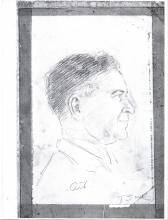
This page shows a sketch drawing in pencil of Arthur A. Ohnimus. The drawing only shows a side profile of Ohnimus face and shoulder.
Artist signature at the bottom of the page: Buel
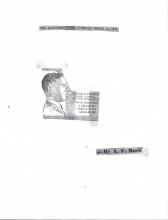
The Sacramento Bee, Tuesday, March 11, 1941
A sketched imaged of Arthur A. Ohnimus from the Sacramento Bee. Next to the picture is a description that reads: Arthur A. Ohnimus, Chief Clerk of the Assembly with more than a decade of service in the legislature.
-- By A. V. Buel
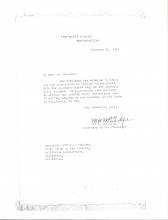
The White House Washington
February 20, 1941
My dear Mr. Ohnimus:
The President has asked me to thank you for your letter of January thirty-first, with the enclosed marked copy of the Assembly Daily Journal. He appreciates your courtesy in writing and sending House Resolutions Nos. 70 and 73, adopted by the Assembly of the State of California, to him.
Very sincerely yours,
Signature of M. H. McIntyre here
M. H. McIntyre
Secretary to the President
Honorable Arthur A. Ohnimus,
Chief Clerk of the Assembly,
California Legislature,
Sacramento,
California.
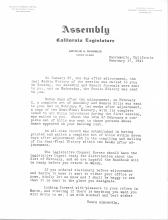
Assembly
California Legislature
ARTHUR A. OHNIMUS
CHIEF CLERK
Sacramento, California
February 17, 1941
On January 27, one day after adjournment, the last Weekly History of the session was mailed to you; on Tuesday, the Assembly and Senate Journals were sent to you, and on Wednesday, the Senate History was sent to you.
Seven days after the adjournment, on February 2, a complete set of Assembly and Senate Bills was sent to you; and on February 8, two weeks after adjournment, a copy of the Semi-Final History, with its complete index to all bills introduced during the first session, was mailed to you. About the 10th of February a complete set of bills was sent to those persons whose names appeared on your mailing list.
An all-time record was established in having printed and mailed a complete set of bills within seven days after adjournment and in the compiling and mailing of the Semi-Final History within two weeks after adjournment.
The Legislative Counsel Bureau should have the Legislative Digest ready for distribution about the 21st of February, and we are hopeful the Handbook will be ready before you return in March.
If you ordered stationery before adjournment and desire to have it sent to either your office or home, kindly let me know and I shall be happy to see that it is sent to the place you designate.
Looking forward with pleasure to your return in March, and trusting if there is anything you want you will write to me, I am with kindest and best wishes
Yours sincerely,
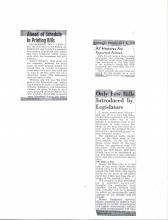
This page displays 3 newspaper clipping.
First newspaper clipping:
Ahead of Schedule in Printing Bills
Sacramento, Feb 3 (I.N.S)-For the first time in the history of California’s split legislative sessions, the printing of proposed bills today had been completed within seven days after the lawmakers had adjourned.
Arthur Ohnimus, chief clerk of the assembly, declared the bills came off state printing presses in record time, in contrast to former years when bills have been held up as long as 30 days after the constitutional recess. The bifurcated sessions began in 1913.
Ohnimus said this was “the first session the bifurcated plan really has a chance to work,” in that theoretically legislators and interested citizens are given 30 days to consider proposed measures before action is taken. About 4000 measures were introduced during the January session.
Second newspaper clipping:
All Measures are Reported Printed
State Printer George Moore today announced the printing, binding and delivery of all of the 3,999 measures introduced in the first part of the legislative season has been completed, one week after the two houses recessed.
Moore declared the short time required for the project set a new record.
Third newspaper clipping
Only Few Bills Introduced by Legislators
If recess comes next Friday-and the IF is a very big one-California’s legislators will have witnessed either one of two things: A last minute rush to put thousands of bills across the desks in the final five days or a new low for the number of proposed laws introduced at any recent biennial session.
The legislature starts tomorrow on the third week of the 1941 session. So far the combined score board of the two houses has registered only 725 measures. This means that to equal the 1939 figure, 3459 bills would have to be introduced in the five legislative days between now and the prospective recess date.
700 Bills a Day
Nearly 700 bills a day or at the rate of one every three seconds would have to be brought in to match the 1939 total-this figure being on the basis of the three-hour day which has been the average of the session to date.
The scarcity of bills presented up to yesterday, however, brought the prediction from Speaker Gordon Garland that this probably will be a session in which an exceptionally small number of law changes will be sought.
Recent legislative developments appeared to indicate that contrary to earlier expectations, the highly controversial subject of relief reorganization will likely not be threshed out at the short session.
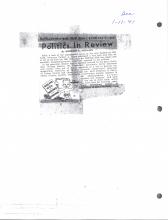
Sacramento Bee, Saturday, January 11, 1941
Politics in Review
By Herbert L. Phillips
After a look at the organization setup in the new legislature this week, Governor Culbert L. Olson managed a wry grin and said he is not at all sure his 1941 duty calls for fighting with the senate and assembly anti-administration majorities opposed to his policies.
In the assembly, despite loyalty pledges exacted by his party chairman, William Malone, the Democratic governor’s forces mustered only twenty votes out of eight members in a bid to prevent the speakership reelection of Gordon Garland, conservative Democrat of Tulare County and Olson political foe. Earl Desmond of Sacramento County, another Democratic conservative equally opposed to the administration, became speaker pro tempore. And back to the job of chief clerk, which he once held for fourteen years, came Republican Arthur A. Ohnimus of San Francisco.
An image is also shown of a baby in a diaper standing up hold a newspaper that reads: Garland, Rich, Desmond, Ohnimus. The background behind the baby is of the legislature building with a flag on top of the building that reads Legislature. The diaper also has the year written 1941 on it.
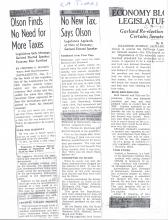
This page displays 3 newspaper clipping.
First newspaper clipping reads:
January 7, 1941
Olson Finds No Need for More Taxes
Legislature gets Message;
Garland Elected Speaker;
Economy Bloc Fortified
By Chester G. Hanson
Times Staff Representative
Sacramento, Jan 6.-On the heels of the organization of the Legislature for its 54th regular session today, which saw the anti-Olson economy bloc swing into the saddle for some fast riding, Governor Olson appeared before the lawmakers and presented to them his biennial message.
It was just about two years ago that Olson, shortly after his inauguration, collapsed and for a time his life was despaired of. Today he appeared to be in good health.
Plea for Harmony
He was also in better spirits and not so ready to have a chip knocked from his shoulder.
In fact he made a plea today for harmony between the legislative and executive branches of government.
(Summation of Governor Olson’s message to Legislature will be found on page 4, Part 1. )
Olson produced nothing new in his message, his declaration and recommendations being generally along the well-known line of his governmental philosophy-except in one important respect
Contrary to his stand of two years ago when he recommended passage of a half dozen or so new revenue-raising measures, this time he informed the Legislature that he finds it unnecessary to recommend any additional revenue producing laws.
Central Valley Project
This utterance brought forth a round of applause from the assembled Assemblyman and Senators, whereupon Olson smiled and said he anticipated that his…*the last few sentences of this newspaper clipping are cut off.
Second newspaper clipping is a continuation of the first newspaper clipping, it reads:
No New Tax, Says Olson
Legislature Applauds at Note of Economy; Garland Elected Speaker
Continued from First Page
Democrats had voted for both Garland and Desmond.
A piece of poetic justice occurred when the clerk of the Assembly was elected. Assemblyman Charles Lyon, himself long in the service of the Legislature, nominated Arthur Ohnimus, who had held the post of chief clerk from 1915 to 1937, when the Democrats took over control of the Assembly. No one else was placed in nomination and Ohnimus was elected by a unanimous vote. Jack Greenberg, former chief clerk, had announced last night that he was withdrawing and would not contest for the office against Ohnimus.
David Oliver was elected assistant chief clerk and Wilkie Ogg, Democrat of Sacramento, was reelected sergeant-at-arms.
Rev. Thomas H. Markham was elected chaplain of the Assembly.
Over on the Senate side, Senator William P. Rich won out over Senator Jerrold Seawell for president pro tempore. The vote was 22 for Rich to 17 for Seawell. The latter cracked, after it was over, that “there was too much Olson against me.”
Committee on Rules
What he meant was that the Olson administration plugged for the election of Rich. It was the Olson partisans’ view that he was the lesser of two evils, because both Seawell and Rich have little use for Olson.
Garland announced the Assembly Committee on Rules as follows: Lyon, Gardiner Johnson, Millington, Call, Voigt, Desmond, Field and Burns.
This gives the Republicans who were clamoring for more of a say in the work of the coalition bloc something to do through Johnson’s presence on the committee.
On the Senate side, the Rules Committee will be composed of Senators Rich, Myhand, Deuell, Breed and Tickle.
Having organized, both houses…*the rest of this newspaper clipping is not shown.
The third newspaper clipping is partially cut off. The title, the first paragraph and part of the second paragraph is unreadable due to it being cut off.
Starting from the middle of the second paragraph:
Seawell held the office throughout the last session. One or two votes will decide the contest tomorrow and both men were claiming victory today.
Both Republicans
Both Seawell and Rich are Republicans. Rich was formerly president pro tem, and was pledged votes to re-elect him in 1939. Injuries sustained in an automobile accident made it impossible for him to attend until the session was well advanced, and Seawell was elected. Senators said today they expected to vote in secret caucus on the post, and that there would be no bitterness over the outcome.
Although Garland’s re-election as speaker was regarded as certain, Assemblyman Cecil King of Los Angeles also will be nominated but he has the support only of a group of sticklers for party regularity, plus supporters of Governor Olson.
Saved Funds
Garland, a Democrat, is a leader of the bipartisan coalition that is credited with saving around ** to taxpayers by enforcing efficiency and non-political administration of relief.
Assemblyman Earl Desmond of Sacramento, Democrat, who was re-elected despite an Olson “purge” campaign, is scheduled for speaker pro tem, it was learned. He was floor leader from the economy bloc last session. That post probably will go to Assemblyman Charles Lyon of Los Angeles.
Arthur E. Ohnimus of San Francisco is scheduled to become chief clerk of the assembly replacing ** ** Greenberg of Los Angeles.
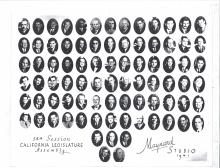
This page displays what might be some type of photo card. It shows a picture of 83 men from the California Legislature Assembly 54th Session. Each individual person has its own photo shaped into an oval. This picture was taken in 1941 at Maynard Studio.
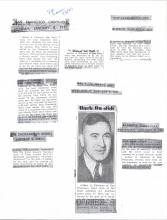
This page displays 7 newspaper clipping.
First newspaper clipping reads:
San Francisco Chronicle
Monday, January 6, 1941
Arthur A. Ohnimus, San Francisco, the most competent chief clerk the Assembly has ever had, is in the lead for the election to his old position from which he was ousted by the Democrats several years ago. He began his legislative service in 1915 and held his post for a 20-year period. Jack Greenberg, chief clerk during the past two years, is a candidate for re-election and Minute Clerk Dave Oliver also is out for the place, but likely will be given the assistant clerkship, with Ohnimus as head of the lower house desk force.
Second newspaper clipping is identical to the first newspaper clipping, it reads:
Ohnimus Favored for Chief Clerk
Arthur A. Ohnimus, San Francisco, the most competent chief clerk the Assembly has ever had, is in the lead for the election to his old position from which he was ousted by the Democrats several years ago. He began his legislative service in 1915 and held his post for a 20-year period. Jack Greenberg, chief clerk during the past two years, is a candidate for re-election and Minute Clerk Dave Oliver also is out for the place, but likely will be given the assistant clerkship with Ohnimus as head of the lower house desk force.
Third newspaper clipping reads:
The Sacramento Union, January 7, 1941
Less cut-and-dried, however, was the lower house’s “promotion” of Floor Leader Earl D. Desmond, Sacramento “economy Democrat,” to the post of speaker pro tem, and its ousting of Jack Greenburg, in favor of Arthur Ohnimus for chief clerk.
Fourth newspaper clipping reads:
Ohnimus for Clerk
Arthur A. Ohnimus of San Francisco was conceded to be far in the lead for chief clerk of the assembly, succeeding the 1940 clerk, Jack Carl Greenburg of Los Angeles. Ohnimus has a former record of fourteen years as chief clerk in the lower house.
Fifth newspaper clipping reads:
The Sacramento Bee
Wednesday, January 8, 1941
Back on Job
Picture of Ohnimus is shown here
Arthur A. Ohnimus of San Francisco, chief clerk of the state assembly for fourteen years prior to 1937, has returned to his post as a result of the reorganization of the lower legislative house this year. He succeeded Jack Carl Greenburg of Los Angeles.
Bee Photo
Sixth newspaper clipping reads:
The Sacramento Bee
Monday, January 6, 1941
Arthur A. Ohnimus of San Francisco was selected as the chief clerk. He was turned to position he held for fourteen years prior to 1937. He succeeds the 1940 clerk, Jack Carl Greenburg of Los Angeles, who did not permit his name to be offered today as a candidate.
Seventh newspaper clipping reads:
Alameda Times Star
Thursday, January 9, 1941
New Desk Staff
They fifty-fourth legislative session has produced some changes in the way of assembly attaches and the lower house is now manned by a most efficient staff.
Arthur A. Ohnimus of San Francisco, veteran chief clerk of the assembly, is back on the job assisted by David V. Oliver, Frank Reed and others.
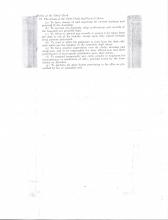
Duties of the Chief Clerk
21. The duties of the Chief Clerk shall be as follows:
(a) To have charge of and supervise all clerical business and printing of the Assembly.
(b) To see that the Journals, other publications and records of the Assembly are properly kept.
(c) To refuse to permit any records or papers to be taken from the desk or out of his custody, except upon duly signed receipts from persons authorized.
(d) To read or allow his assistants to read from the desk only such matter as the Speaker of the Assembly shall direct.
(e) To have general supervision over all clerks, attaches and employees, and to be responsible for all their official acts and their performance of and regular attendance upon their duties.
(f) To suspend temporarily any clerk, attaché or employee for incompetency or dereliction of duty, pending action by the Committee on Attaches.
(g) To perform all other duties pertaining to his office as prescribed by law or Assembly rule.
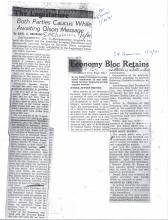
This page displays 3 newspaper clipping.
First newspaper clipping reads:
S.F. Chronicle 1/6/41
The Legislature
Both Parties Caucus While Awaiting Olson Message
By Earl C. Behrens
Sacramento, Jan 5-Reorganization programs for both the Senate and the Assembly occupied Republican and Democratic caucuses tonight as Governor Olson completed the message he personally will deliver to the Legislature when it convenes for its fifty-fourth regular session tomorrow.
The Governor will submit his program for the second half of his administration. This is understood to include a proposed State WPA works plan to offset the plans of a big group of legislators who favor junking the SRA and returning relief administration to the counties.
Both the Republicans and the Democrats in the Assembly scheduled their caucuses tonight in order to have maximum attendance.
Democratic Speaker Gordon Garland has more votes than he needs for re-election as presiding.
*The rest of this news clipping is covered up by newspaper clipping 2.
Newspaper clipping 2 is a continuation of the first newspaper clipping, it reads:
The first half of the bifurcated session which begins tomorrow may run for no more than 30 days. Then a recess of at least 30 days must be taken before the final half of the session begins. The second half may run indefinitely. But legislative leaders hope to finish their work earlier than usual this year.
He is a member of the bi-partisan economy bloc and is an anti-Olson administration legislator. Tentative plans as placed before the Republican minority, which consists of 38 out of the 80 members of the lower house, call for the selection of Democratic Assemblyman Earl D. Desmond, Sacramento, as speaker pro tem of the Assembly, and Republican Assemblyman Charles W. Lyon, a legislative veteran, as floor leader of the bi-partisan coalition.
Arthur A. Ohnimus, San Francisco, the most competent chief clerk the Assembly has ever had, is in the lead for the election to his old position from which he was ousted by the Democrats several years ago. He began his legislative service in 1915 and held his post for a 20-year period. Jack Greenberg, chief clerk during the past two years, is a candidate for re-election and Minute Clerk Dave Oliver also is out for the place, but likely will be given the assistant clerkship, with Ohnimus as head of the lower house desk force.
Democratic State Chairman William M. Malone was due tonight for the Democratic caucus. Democrats admitted they could not prevent the re-election of Speaker Garland because of the strength of the bipartisan economy bloc, which includes the Democrats whom they Governor tried to “purge” at the elections last fall.
Some of the Democrats who voted with the Governor during the past two years did not favor…*the last part of the newspaper clipping is cut off.
Third newspaper clipping is a continuation of another newspaper clipping which is not shown. It reads:
SF Examiner 1/7/1941
Economy Bloc Retains
(Continued from Page One)
in my budget message to recommend enactment of any additional revenue measures at this regular session.”
Other Appointments
Other phases of the Governor’s message, however, gave promise of renewal of some of the bitter fights of two years ago, notably his declaration in favor of compulsory universal health insurance; his announcement in favor of a State housing authority; a proposal that liquor regulation be taken from the State board of equalization and given to a new State agency; and a new request that the legislature authorize the issuance and sale of $180,000,000 in Central Valley Project bonds for use in general public utility development by the State or local communities.
Organization of the assembly proceeded according to schedule following Garland’s re-election as speaker.
Assemblyman Earl Desmond of Sacramento, floor leader last session, was elevated to the post of speaker pro tem, and Assemblyman Charles Lyon of Los Angeles, Republican, became floor leader.
Arthur A. Ohnimus of San Francisco, who served as chief clerk of the assembly from 1915 to 1037, was restored to that important job by unanimous vote, succeeding Jack Carl Greenberg of Los Angeles.
Willkie Ogg was re-elected as sergeant at arms by unanimous vote, and David Oliver was returned to his post as minute clerk.
Vote Kept Secret
The senate battle over president pro tem. was threshed out, in accordance with custom, at a secret caucus preceding the formal organization session.
Just how the senators voted will not be known, but it was no secret that the eighteen senate Democrats held the balance of the power, with the twenty-two Republicans split between two popular and respected colleagues.
Senator Robert W. Kenny of Los Angeles openly announced that he voted for Rich and seconded his nomination.
Joseph Book was re-elected as senate secretary, and Joseph Nolan as sergeant at arms.
Olsonites Shelved
In neither assembly nor senate did Olson Democrats fare well in the appointment of the powerful rules committee.
Members of the new senate rules committee are Rich, Arthur Breed and Ed Tickle, Republicans, *the rest of this news clipping is not shown.
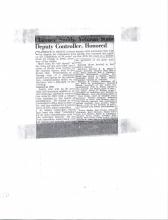
Clarence Smith, Veteran State Deputy Controller, Honored
CLARENCE SMITH H. SMITH, veteran deputy state controller who will be eligible for retirement next spring, was honored last night on the completion of 30 years’ service with the state at a dinner given by Joseph A. Beek, secretary of the senate.
More than 30 “old timers” in the state service and other associates of Smith were invited to the surprise dinner, held in the Sutter club. Presentation of a framed copy of a resolution passed last spring by the legislature, congratulating Smith on a birthday, was a highlight of the evening.
Started in 1910
Smith, who will be 60 next may and therefore eligible to retire with pay, started to work for the state in 1910 with a temporary position in the board of equalization. He moved to the controller’s office after a year or so, and has worked for a succession of five state controllers.
As deputy controller, Smith has been the chief “watchdog” of all state expenditures, next to the controller himself. He has had immediate supervision over all claims and payrolls over the payment of all state warrants.
Among those invited to last night’s dinner:
Adjutant General R. E. Mittelstaedt, Attorney General Earl Warren, State Senators Roy J. Nielsen, Thomas McCormack, Charles H. Deuel and Frank L. Gordon, State Controller Harry B. Riley, State Treasurer Charles G. Johnson.
Richard E. Collins, chairman of the board of equalization; Dixwell Pearce, secretary of the board of equalization; Fred B. Wood, legislative counsel; Joe Beard, chief of capitol police; Frank N. Killam, superintendent of buildings and grounds; Fred Mispley, state purchasing agent.
Fred Links, chief of budgets and accounts; Charles Hagerty, deputy secretary of state; Jess Hession, deputy attorney general; Bob Alexander, retired assistant state printer; Paul Mason, chief of the division of drivers’ licenses and senate parliamentarian.
Arthur McKee, Bert Foster, Arthur Ohnimus, Herb Bronner, Harry Jordan, Jim Hickey, Albert F. Zangerle, Charles Paine, Julian Lindsay, Bill Watts, Bart Greer, Frank Lewis, John Sherburn, John Lea and Howard McIntyre.
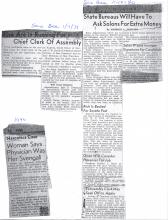
This page displays 4 newspaper clipping.
First newspaper clipping reads:
Sac Bee 1/7/37
Five are in Running for Chief Clerk of Assembly
Five candidates were in the running today for chief clerk of the assembly as the legislature convened.
The candidates came out as James Smythe of San Francisco announced he would not be a candidate to succeed himself.
Principal Contenders
The principal contenders for the position were Jack Greenberg of Los Angeles, David Oliver of Merced, C.W. Booth of Oakland, Robert Gilmour of San Francisco and Arthur Ohnimus of San Francisco.
Ohnimus was the chief clerk for several sessions before being displaced in 1937 by Smythe when the Democrats obtained a majority in the lower legislative house.
David Gill of Los Angeles, John McGillicuddy of Sacramento and Samuel McCance of Los Angeles were said to be the principal contenders for the post of chaplain of the assembly.
Will Name Chaplain
Assemblyman Earl D. Desmond of Sacramento County said he would nominate Dr. A. Raymond Grant of the First Methodist Church as the assembly sergeant at arms.
Joseph Nolan, veteran sergeant at arms o the senate, was expected to be renamed to his position with Joseph Beek retaining his position of senate secretary.
Second newspaper clipping reads:
Narcotics Case
Woman Says Physician was her Svengali
Before an audience composed largely of City Hall politicians and fraternal leaders, Dr. Myron B. Fractman, 59-year-old physician, was painted yesterday as a kind of modern Svengali.
Appearing before Municipal Judge Morris on felony charges of prescribing narcotics for someone not his patient, Dr. Fractman specifically was accused of administering a half grain of morphine sulphate to 19-year-old Mrs. Bernice Brown Tweedy.
A parade of physicians preceded Mrs. Tweedy to the stand during the all-day hearing. Three, Dr. John Golden, Dr. Daniel Cronin and Dr. Joseph Peter Keenan, testified they had given the girl partial examinations and all had noted a swelling on her left arm…*the rest of this newspaper clipping is cut off.
Third newspaper clipping reads:
Sac Bee 11-19-40
State Bureaus will have to Ask Solons for Extra Money
By Herbert L. Phillips
State departments which are insisting on the need for 1941-43 budget increases above their current appropriations will have to fight for such extra money when the next legislature meets, instead of leaving the battle solely to the Olson administration.
State Finance Director George Killion, promising an economy budget though many departments are asking increases, has indicated this position plainly on several occasions during budget hearings which have been in progress for some days and continued today with appropriation requests from the fish and game commission, the banking department and the department of education.
Said Killion:
When Governor Olson took office in January, 1939, and his first budget, many departments urged the need for generous budget allowances. Then they did nothing whatever to justify such appropriations at the legislative session. When certain legislators opposed the governor’s budget and made charges of extravagance, most of the departments did not raise a finger to defend the allowances on which they had been so insistent.
Rich is backed for Senate Post
Reports reaching the Capitol today said friends of Republican Senator W.P. Rich of Marysville, Yuba County, are starting a drive to elect him president pro tempore of the 1941 state senate, replacing Republican Senator Jerrold L. Seawell of Roseville, Placer County.
Rich was president pro tem and GOP senate leader during the Merriam state administration but had to retire from that post after serious injury in an automobile accident. The job went to the Seawell who has been increasingly active in GOP political affairs since then, serving during the recent campaign as Willkie electioneering director for the northern counties.
Olson will Consider Havenner for Job
Governor Culbert L. Olson announced he will give “serious consideration” to Congressman Franck R. Havenner of San Francisco for appointment to the state railroad commission when the term of Republican Frank Deylin expires next January…
*The bottom of this newspaper clipping is covered.
Detectives’ license bureau-$20,000, received $17,400 last time.
Board of prison terms and paroles-$57,130; compared with a current allowance of $39,250.
Advisory pardon board-$15,170. The 1939-41 appropriation was $14,613.
Ex-assembly Clerk May Seek Office Again
Arthur A. Ohnimus of San Francisco, chief clerk of the state assembly for thirteen years, maybe a candidate next January for the legislative post he held until 1937.
If the Republicans gain the upper hand in assembly maneuvering, Ohnimus’ hat is expected to be in the ring for the clerkship. His long service in legislative sessions came to an end when the Democrats mustered a lower house majority three years ago.
The present assembly chief clerk is Jack Carl Greenburg of Los Angeles.
Solon would Increase Signature for Candidate
Assemblyman Thomas Doyle of Los Angeles County announced he plans to introduce legislation next January which would increase from 5 to 20 per cent the number of signatures required to qualify an independent candidate for a place on California election ballots.
Doyle told the International News Service:
With the Communist Party now barred by law, Reds still are able to place their names on the ballot easily as “independent” candidates.
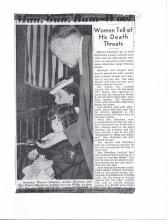
Man, Gun, Rum-Woe!
Women Tell of his Death Threats
Picture of Ohnimus showing a little boy sitting on his mother’s lap a gun
Description under the picture reads: Assistant District Attorney Arthur Ohnimus asks Mrs. Emma Obershaw, holding her son, Philip, to identify the gun with which her estranged husband is charged with threatening another woman.
Edward Obershaw, 32, of 1754 Eighteenth Avenue, railroad yard clerk, had the odds against him when he appeared in court today before Municipal Judge Theresa Meikle.
Obershaw was charged with threats against his wife; assault with a deadly weapon and violation of the gun law. The odds against him were two very irate women against one man.
The women who testified against him were his estranged wife, Emma, who appeared in court with her young son, Philip, 3, and his wife’s friend, Mrs. Jean Tena Alayeto, 1139 Tennessee Street, with whom Mrs. Obershaw makes her home.
Last Sunday, they said, Obershaw, whose wife had sued him for divorce, appeared at the Alayeto home and drew a gun on the wife’s friend.
While Mrs. Obershaw, with young Philip on her lap, was seated in Obershaw’s car at the curb, Mrs. Alayeto stood in the open doorway, she testified, and the man pointed a gun at her and “threatened to shoot my brains out.” Mrs. Obershaw, she said, grabbed the gun.
Mrs. Alayeto said Obershaw bore her resentment because he felt she had induced the wife to leave him.
Mrs. Obershaw testified that her husband had threatened previously to “to cut her throat” and that he came to the Alayeto home brandishing the gun and fired a shot onto the floor.
After hearing the women’s story Judge Meikle ordered Obershaw held on the assault charge, setting bail at $10,000 bond or $5,000 cash. On the charge of threats against life, the judge ordered him held in custody pending posting of a $10,000 peace bond. The gun law charge was dismissed.
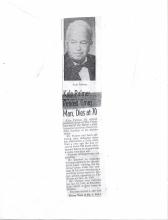
An image of Kyle Palmer is shown here
Kyle Palmer
Kyle Palmer, Retired Times Man, Dies at 70
Kyle Palmer; 30, retired political editor of The Times and one of the nation’s most respected political observers, died Tuesday at his Malibu home.
Mr. Palmer had been suffering from leukemia since his retirement a little more than a year ago. He had received about 100 blood transfusions before he slipped into a coma two days ago.
Funeral arrangements are pending.
He planned to continue writing regularly for the editorial page, viewing the national scene from the vantage of his four decades as a working editor-reporter. His last article appeared in The Times on Jan 23, 1961.
Mr. Palmer was married on Jan 16, 1941, to Elizabeth Jane Halff, of their home in Malibu.
He, also leaves a son and…
Please turn to Pg. 2, Col. 1 *that page is not shown.
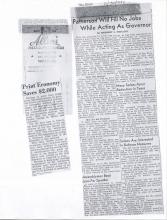
This page displays 3 items: an ad and 2 newspaper clipping.
The ad reads:
Allen’s
Press Clipping Bureau
San Francisco
Los Angeles
Portland, Ore
Sacramento Cal., Union
Cir.11584
February 5, 1942
Second item is a newspaper clipping it reads:
Print Economy Saves $2,000
Savings of more than $2,000 every legislative session by printing senate and assembly journals on newsprint instead of book paper, will take only a small bite out of the $25,000 cost of printing constitutional amendments for the November election, “but every little bit helps,” State Printer George H. Moore said yesterday.
For the first time in history, the daily publications of the legislature at the last special session appeared on newsprint, Moore said. The innovation was made at the suggestion of Arthur A. Ohnimus, chief clerk of the assembly, it was revealed.
More than 700,000 pounds of newsprint, about 14 boxcar loads, have been ordered in preparation for printing the constitutional amendments-the guide for voters at the election this fall, more said. Arrival of the first shipment is expected in July.
Savings in book paper through cooperation of the legislature, officials said, would provide a backlog of 259,113 sheets of paper to be diverted to textbooks.
Third item is another newspaper clipping it reads:
Sac Bee 11/30/1942
Patterson will fill No Jobs While Acting as Governor
By Herbert L. Phillips
With the assertion he never has “kicked a man when he was down,” Acting Governor Ellis E. Patterson today announced he will make no state political appointments during the next ten days while defeated Governor Culbert L. Olson is in Washington D.C.
Lieutenant Governor Patterson possesses full legal power to make most of outgoing Olson administration’s major appointments, if he chooses, during the governor’s absence from the state. These include seven or eight important judgeships, among them an associate justice of the state supreme court and a member of Sacramento’s third district court of appeal.
Cites Old Quarrel
“When Olson and I had an altercation when he was in Chicago for the Democratic National Convention in 1940,” said Patterson, “he was top dog and I had just gotten a good drubbing on the presidential primary election slate. So I did not mind telling him to go to hell when he attacked me.
“Now he is down and out. I have never kicked a man when he was down. That has been my philosophy through life. Even though it may appear that he has been unjust to me at times, that is no reason why I should be unjust to him or betray the confidence the people have placed in our Democratic administration.
Has No Job Promises
“I shall make no state appointments while Olson is gone, unless there is some emergency or catastrophe of unforeseen character which necessitates action. We’ve made no deals or commitments. Olson has promised me no job. I have not made up my mind whether I shall apply for one.”
Patterson said neither Olson nor anyone else ever has talked to him about the current rumors of involved resignations and appointments under which the two defeated Democratic leaders both might and on the public payroll again. Patterson said he might enter the armed forces or take some other public job, perhaps federal employment.
Questioned as to the possibility he might resign as lieutenant governor before his term ends on January 4th, Patterson replied:
I have nothing to say about that.
Assemblyman Back Lyon for Speaker
A rush of legislators to climb abroad a Republican managed bandwagon for Assemblyman Charles W. Lyon of Los Angeles County, candidate for the 1943 assembly speakership, today was reported to have assured him nearly fifty votes, with more perhaps in prospect.
The Republicans filled forty three of the eighty lower house seats at the November 3rd election. With that majority against them, the Democrats, or most of them at least, apparently regard Lyon as a shoo in for the gavel wielding job. In fact, some of them are…*the last few sentences of this column are cut off. Continues on the next column: things, he has been mentioned for the directorships of agriculture, public works or finance. The governor elect did not mention Garland or any other possible appointee while in Sacramento Saturday, however. He said he had no reached a definite decision on any of his key appointments.
Arthur A. Ohnimus of San Francisco for reelection as chief clerk of the assembly where he has served for many years.
Wilkie Ogg of Sacramento for another term as assembly sergeant at arms.
Assemblyman Thomas A. Maloney of San Francisco who announced for lower house presiding officer last Spring, as a possible selection for speaker pro tem if the speakership goes to Lyon.
Many Solons Favor Reduction in Taxes
The Associated Press, conducting a presession survey of 1943 legislators, reports nearly 80 per cent of those answering its questionnaire favor state tax reductions or modifications to offset rising federal levies.
The personal income tax, the sales tax and the inheritance tax were listed as the levies most likely to be proposed pruning, although the members of the two houses failed to agree completely on how to go about it. Senators indicated a more cautious approach to the tax question than did lower house members.
As for the assembly speakership, more than 60 percent of the assemblymen replying to the AP survey questions picked Lyon for the job. No other name was mentioned.
Solons are Interested in Defense Measures
The AP survey listed the following among other subjects of legislation in which various 1943 lawmakers are interested:
Possible charges in the California State Guard organization law, storm center of the special legislative session of last January.
Revision of the state council of defense, a thing the incoming governor has said he favors.
Measures to gear the state more closely to federal war activities.
Legislation to enforce dim out regulations.
An enforcement law for the 35 mile an hour automobile speed limit.
Further legislation to improve the statewide forestry and fire prevention program.
Liberalization of the old age assistance law in view of increased living costs.
Possible measures for the regulations of labor unions.
Revisions of the Unemployment Insurance Act to eliminate buses.
Streaming of the state system of handling birth records.
Legislation to establish nurseries for the children of women employed in war industries.
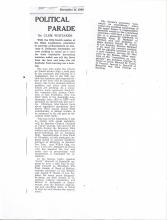
December 9, 1940
Political Parade
By Clem Whitaker
With the fifty-fourth session of the State Legislature scheduled to convene at Sacramento on January 6, California lawmakers are now seeking to round up a crew for their legislative harvesting machine which can sift the flaws from the laws and keep the old haybaler from burning out a bearing.
The men who make the wheels go found always play a vital part in the successes and failures of a Legislatures, but at the 1941 session the burdens and responsibilities of the crew will be unusually heavy, due to the national defense problem and other vital issues which are pending. As a consequence, some seasoned, hard-bitten veterans-like Arthur Ohnimus of San Francisco, who was chief clerk of the Assembly continuously from 1915 to 1916-will probably be called back into service. Ohnimus, who knows more about legislative machinery than Henry Ford knows about Ford automobiles, is almost certain to be returned to his old post as Assembly chief clerk.
Top man in the Assembly, it can be stated with equal certainty, will be Speaker Gordon Garland of Tulare County, who proved his mettle during the Economy Bloc battles and was first elected to his gavel-pounding job in January, 1940. Assemblyman C. Don Field of Glendale, an able strategist, appears slated to succeed Gardiner Johnson of Berkeley as Speaker Pro Tem. And Wilkie Ogg, the Assembly’s Sergeant-at-Arms, who has handled the law and order end of proceedings with satisfaction, is scheduled for reelection.
In the Senate, burly, capable “Jerry” Seawell of Roseville appears to have a safe lead to succeed himself as President Pro Tem. Joseph A. Beek of Balboa, veteran secretary of the Senate, and Joseph F. Nolan of Los Angeles, for many years Sergeant-at-Arms, are both certain of reelection without opposition, and Robert G. Alderman of Sacramento, now the Senate’s engrossing and enrolling clerk, is slated to step up and become the minute clerk.
The Senate’s powerful “committee on committees,” which names the standing committees of the upper house-a responsibility formerly vested in the Lieutenant Governor-will have a new member, it is generally predicted, in Senator Peter P. Myhand of Merced, who will probably replace Senate Robert W. Kenny of Los Angeles. Senator Myhand, if he wins the coveted position, will be signally honored, as he is a new member, serving his first term in the Senate. Other members of the “committee on committees,” are Senators Charles H. Deuel of Chico, Edward H. Tickle of Carmel, Jerrold L. Seawell of Roseville and John Phillips of Banning.
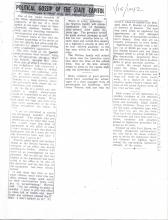
Words below that are unreadable will be replaced by two asterisks.
1/15/1942
Political Gossip of the State Capitol
By John W. Dunlap, United Press Correspondent
One of the major scandals of the Olson administration was the exposure of the use of a dictograph in the hotel room of then Assembly Speaker Gordon Garland, and the resulting legislative investigations and excitement.
Governor Olson at that time disclaimed knowledge of the entire affair but said he had often used dictographs to record conversations with prospective appointees.
The first week of the Warren administration shed further light on the dictograph situation. Warren himself revealed that after three days of expert sleuthing, wiring technicians had uncovered a maze of wires leading to hidden microphones and induction coils in the eight principal offices of the governor’s suite, with outlets leading to a room directly above the governor’s desk, where the information was recorded.
By the flip of a switch, any telephone or spoken conversation could be transcribed in any way of the offices of waiting rooms. Wires led under the rugs and were built into walls, apparently at the time Olson remodeled the offices in 1939.
“I am not interested in starting any dictograph scandal,” Warren explained. “The people who preceded me can do what they want. But I don’t want that kind of equipment in any office of mine. I don’t propose to use that kind of equipment, nor do I want the wiring discovered later and have it appear that I put it in.”
Warren added there was nothing illegal in the devices because the occupant of an office can install anything he wishes. Neither will there be an investigation, he emphasized. But he did say that the leaders of the legislature had been called to his office to be told o the discovery and the fact that all the equipment had been disconnected.
“I told them that they or any other citizens could come into my office without being spied upon, or their conversations being subject to eavesdropping,” Warren said. “I’m not seeking to make a scandal. I want to give this office a clean bill of health and don’t want any evidence around the office. I don’t believe in it.”
*The bottom part of this column is cut off. It continues on the second column.
There is every indication the Warren family will enter ** community life of ** ** after several false starts ** years ago. The governor revealed he made several attempts to establish his law practice here in the early days and served five months as a legislative attaché in 1919, but he was offered positions in the bay area which he could not decline.
The Warren family will actually move into the executive mansion after the close of the school term. One of the kids already wants to sleep in the cupola high atop the three-story house.
Many students of good governments have preached the advantages of a state manager form of a government for California. Governor Warren took one step toward it when he named City Managed John F. Hassler of Oakland, as director of finance. The next step came when he approved the appointment of City Manager James Dean of Sacramento as Hassler’s deputy. Both men are nationally prominent in their fields.
Significantly, Hassler took a salary cut of $2,000 per year to take the $10,000 finance post and Dean dropped $2100 to accept $7,500 for the deputyship. Apparently Warren sold them on the job to be done, even at great personal sacrifice.
Lastly, the second deputy job under the Olson administration will be abolished to save the salary on the premise that Hassler and Dean can easily do three men’s work. As a matter of fact, the deputies under Olson’s regime left most of the actual finance work to the civil service staff.
Each return of the legislature is another evidence of the efficient experience of State Secretary Joe Beek and Assembly Chief Clerk Arthur Ohnimus. These two men are the quiet, competent type who say little but get the job done. They have the complete confidence of everyone and have kept new officials, members and attaches guided in legislative procedure for going on 30 years.
Teamed up with Paul Mason, nationally recognized parliamentarian who leaves his motor vehicle post to advise the legislature, Beek and Ohnimus are without doubt among the top-ranking legislative officials in the nation.
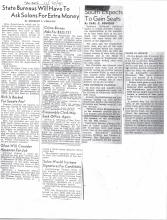
This page displays 2 different newspaper clipping.
First newspaper clipping:
Sac Bee 11/20/40
State Bureaus will have to Ask Solons for Extra Money
By Herbert L. Phillips
State departments which are insisting on the need for 1941-43 budget increases above their current appropriations will have to fight for such extra money when the next legislature meets, instead of leaving the battle solely to the Olson administration.
State Finance Director George Killion, promising an economy budget though many departments are asking increases, has indicated this position plainly on several occasions during budget hearings which have been in progress for some days and continued today with appropriation requests from the fish and game commission, the banking department and the department of education.
Said Killion:
When Governor Olson took office in January, 1939, and made his first budget, many departments urged the need for generous budget allowances. Then they did nothing whatever to justify such appropriations at the legislative session. When certain legislators opposed the governor’s budget and made charges of extravagance, most of the departments did no raise a finger to defend the allowances on which they had been so insistent.
Rich is backed for Senate Post
Reports reaching the Capitol today said friends of Republican Senator W. P. Rich of Marysville, Yuba County, are started a drive to elect him president pro tempore of the 1941 state senate, replacing Republican Senator Jerrold L. Seawell of Roseville, Placer County.
Rich was president pro tem and GOP senate leader during the Merriam state administration but had to retire from that post after serious injury in an automobile accident. The job went to Seawell who has been increasingly active in GOP political affairs since then, serving during the recent campaign as Willkie electioneering director for the northern counties.
Olson will Consider Havenner for Job
Governor Culbert L. Olson announced he will give “serious consideration” to Congressman Franck R. Havenner of San Francisco for appointment to the state railroad commission when the term of Republican Frank Devlin expires next January 15th.
Havenner, a progressive Democrat, was defeated for reelection to congress, November 5th, by Republican Thomas Rolph, brother of State Governor James Rolph, Jr.
Crime Bureau asks for $525,731.
With the declaration the state crime bureau will play an important part in the increasing police activities which accompany national defense preparations, Charles Stone, chief of the state division of criminal identification and investigation, has submitted a 1941-43 budget request for $525,731.
This request, compared with $440,851 received by the division for the currently biennium, contemplates increases both in trained personnel and equipment, including expanded police teletype facilities.
The opening of new offices in Redding, Santa Barbara, Bakersfield, San Diego and Santa Rosa, for closer supervision of men released on parole from California prisons, is planned by John Gee Clark, state director of penology. He announced this late yesterday in presenting a parole division budget request for $234,760, as against a previous allowance of $177,140 for 1939-41.
Other budget requests include:
Department of penology, administrative costs-$11,860, as compared with $14,572 given it from the emergency fund for the present biennium after the 1939 legislature denied money for it.
Detectives’’ license bureau-$20,555; received $17,400 last time.
Board of prison terms and paroles-$57,130; compared with a current allowance of $39,250.
Advisory pardon board-$15,170. The 1939-41 appropriation was $14,613.
Ex-assembly Clerk May Seek Office Again
Arthur A. Ohnimus of San Francisco, chief clerk of the state assembly for thirteen years, may be a candidate for next January for the legislative post he held until 1937.
If the Republicans gain the upper hand in assembly maneuvering, Ohnimus’ hat is expected to be in the ring for the clerkship. His long service in legislative session came to an end when the Democrats mustered a lower house majority three years ago.
Solon would Increase Signatures for Candidate
Assemblyman Thomas Doyle of Los Angeles County announced he plans to introduce legislation next January which would increase from 5 to 20 per cent the number of signature required to qualify an independent candidate for a place on California election ballots.
Doyle told the International News Service:
With the Communist Party now barred by law, Reds still are able to place their names on the ballot easily as “independent” candidates.
Second newspaper clipping reads:
South Expects to Gain Seats
By Earl C. Behrens
Southern California legislators expect to reduce Northern California representation in the Assembly by at least three seats in the proposed new reapportionment bill which will come before the 1941 session of the Legislature.
Ten years ago, the reapportionment issue was one of the most bitter questions before the Legislature. The South came up with the largest number of seats both in the Assembly and in the House of Representatives at Washington. Los Angeles county walked away with the most seats.
San Francisco was awarded nine Assembly seats with each of her districts having an average population of around 70,000. In some of the San Joaquin valley and Southern California districts, outside of Los Angeles, the average size of some districts ran as low as 54,000.
New Districts Planned
At least two and possibly three additional congressional seats will be allotted to California under the 1940 census.
Already, the Southerners are considering cutting up the present Nineteenth district, San Bernardino, Riverside and Orange counties, into two districts.
Members of the Republican bloc in the Assembly recently met in Los Angeles and discussed the reapportionment matter along with the question of the speakership for the 1941 session.
Democratic Speaker Gordon Garland of Tulare County, elected by the bi-partisan GOP and Democratic bloc, at the special session in January; Republicans Gardiner Johnson, Berkeley, and Thomas A. Maloney, San Francisco, are announced candidates for the speakership.
Fight in Senate
On the Senate side, President Pro Tem, Jerrold L. Seawell, Roseville, is out for reelection. Senator W. P. Rich, Marysville, who preceded Seawell in that post, is a contender for the position. Seawell succeeded Rich after the latter was severely injured in an automobile accident in December, 1938, while returning from the funeral of a colleague, John B. McCall of Redding.
Letters have gone to each Senator from Seawell and Rich announcing their candidacies. They are Republicans and since the GOP has an ample majority in the Senate, a member of that party is due to be named president pro tem.
A contest over the job of chief clerk of the Assembly is brewing. Chief Clerk Jack Carl Greenberg, a protégé of Democratic Assemblyman Ernest Voigt, Los Angeles, who joined the economy bloc at the special session, is out for reelection. David V. Oliver of Merced, minute clerk, would like to be promoted to the chief clerk’s place. Friends of Arthur A. Ohnimus, San Francisco, who severed as chief clerk for years may urge him to get into the race for the position.
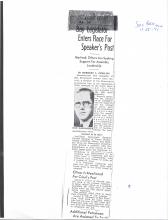
Sac Bee 11-25-41
Bay Legislator Enters Race for Speaker’s Post
Garland, others are Seeking Support for Assembly Leadership
By Herbert L. Phillips
Assemblyman Dan Gallagher of San Francisco’s twenty third district, a member of the Democratic progressive bloc in the legislature, today emerged as the latest aspirant for the speakership of the 1941 state assembly.
Reports reaching the Capitol said Gallagher and his supporters are taking an active part in the presession maneuvering over the speakership and, like several other speakership electioneering groups, have begun the solicitation of backing among the new assemblymen elect.
Garland is in Race
Anti-Olson Democratic Speaker Gordon Garland of Tulare County, chosen presiding officer last January when ten Democratic conservatives formed a coalition with the Republicans to seize control of the lower house from the Olsonite, is…*The bottom part of this is cut off but it continues with:
is appointed in accordance with population and the cities have a commanding vote whenever they choose to unite on a legislative issue.
It is estimated California will gain two and perhaps three additional seats in the lower house of congress.
Oliver is mentioned for Clerk’s Post
David V. Oliver of Merced, minute clerk of the present assembly, is being talked about as a possible candidate for chief clerk of that house when the 1941 regular legislature organizes.
The present chief clerk is Jack Carl Greenberg of Los Angeles.
Arthur A. Ohnimus of San Francisco, chief clerk for many years who lost his post in 1937 when the Democrats took over assembly control from the Republicans, may try to recapture the job.
Note: There is also a picture shown of Dan Gallagher in this newspaper clipping.
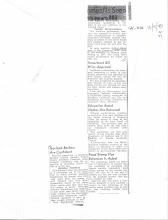
Words that are unrecognizable will be replaced by two asterisks.
Garland Backers are Confident
Political supports of Assembly Speaker Gordon Garland, Tulare county anti-Olson Democrat, today declared confidently that his reelection as presiding officer for 1941 is in the bag.
Situation Smoothed
This followed what was described as a smoothing out of the situation in which thirteen assembly Republicans for several days have held aloof from the camps of both Garland and Cecil King, speakership choice of the Democratic caucus-and thus have held the balance of power. With the thirteen Republicans now expected to join more than thirty votes already claimed by the Republican conservative Democratic coalition Garland appeared to have more than enough strength to win.
Both Republicans Thomas Muloney, San Francisco and ** ** ** County were reported withdrawing their speakership candidacies in the light of the new additions to the Garland forces.
Possible Reorganizations
The tentative agreements, however, are rumored to involve possible reorganizations in assembly committee personnel, general handling of affairs in the lower house and perhaps changes in key attaché posts after the new year begins.
In some quarters Arthur Ohnimus of San Francisco, chief clerk of the assembly for thirteen years ending in 1937, was being mentioned prominently for return to that job.
Investment Bill Wins Approval
Legislation authorizing life insurance companies to invest in residential properties was approved by both houses, paving the way for moderate cost housing projects.
The bill introduced by Assemblyman Charles W. Lyon of Los Angeles County, go through the senate after debate had cleared away opposition.
Lyon said the Metropolitan Life Insurance Company contemplates a $10,000,000 housing enterprise in Southern California and like undertakings are being considered by insurance firms elsewhere.
Education Board Names are Returned
Without confirmation, rejection or prejudice, they said, members of the senate return to Governor Olson the names of three of his appointees to the state board of education. The governor may resubmit them when the 1941 regular legislature convenes next month.
The appointees are Mrs. Lois Souter of Los Angeles, Miss Alice Dougherty of Oakland and T. M. Tadlock of Eureka, Humboldt County.
A controversy over the Silver Burdette textbook contract of the board of education is under investigation by the Hays senate committee on governmental efficiency.
Food Stamp Plan Extension is asked
The legislature asked the secretary of agriculture to inquire into the possibility of extending the federal surplus commodity food stamp system to low income persons who may be ill fed and ill clothed but are not now included in the program because they are not actually on relief.
Approval also was given a resolution designed to give reliefers a chance to take advantage of the cotton stamp purchase plan as well as that involving surplus food stuffs.
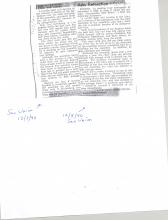
This page displays 2 newspaper clipping.
First newspaper clipping reads:
Sac Union 12/3/40
Fight on Assembly Clerk Job Looms
A terrific fight will develop at the January 6 session of the legislature over the chief clerkship of the assembly-and don’t think this job is peanuts, because of its unimpressive title.
Jack Carl Greenberg of Los Angeles holds the post now, but two who will oppose him come January will be Arthur Ohnimus, San Francisco Republican, and Dave Oliver, assembly minute clerk from the south.
The chief clerk gets $10 per diem salary for every day he can prove to the chairman of the assembly attaché committee that he is working for the assembly. In addition he gets expenses and mileage.
Although the assembly meets only a few months a year, the chief clerk can provide himself with enough work to stretch out the annum. For instance, Greenberg came to Sacramento a few days ago to prepare for a meeting of the fish and game commission-lay out materials, etc.-and was entitled to $104 mileage alone.
Reports are that if Gordon Garland is re-elected speaker of the assembly he will replace Voigt with Al Wollenberg, San Francisco Republican, and Greenberg will be ousted.
Second newspaper clipping reads:
Ask Retraction
EDITOR: In reading your newspaper of December 3, 1940, at page 8, under the column, “Sacramento Slide Show,” I find the following statement:
“A terrific fight will develop at the January 6 session of the legislature over the chief clerkship of the assembly-and don’t think this job is peanuts, because of its unimpressive title.
“Jack Carl Greenberg of Los Angeles holds the post now, but two who will oppose him come January will be Arthur Ohnimus, San Francisco Republican, and Dave Oliver, assembly minute clerk from the south.
“The chief clerk gets $10 per diem salary for every day he can prove to the chairman of the assembly attaché committee that he is working for the assembly. In addition he gets expenses and mileage.
“Although the assembly meets only a few months a year, the chief clerk can provide himself with enough work to stretch out the annum. For instance, Greenberg came to Sacramento a few days ago to prepare for a meeting of the fish and game commission-lay out materials, etc.-and was entitled to $104 mileage alone.”
Allow me to make it known to you at this time that your statement, “Greenberg came to Sacramento a few days ago to prepare for a meeting of the fish and game commission-lay out materials, etc.-and was entitled to $104 miles alone,” is incorrect and untrue.
I therefore demand a retraction of the name immediately.
JACK CARL GREENBURG
Assembly Chambers
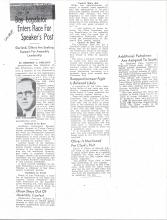
This page displays 3 newspaper clipping.
First newspaper clipping reads:
Bay Legislator Enters Race for Speaker’s Post
Garland, Others are Seeking Support for Assembly Leadership
By HERBERT L. PHILLIPS
Assemblyman Dan Gallagher of San Francisco’s twenty third district, a member of the Democratic progressive bloc in the legislature, today emerged as the latest aspirant for the speakership of the 1941 state assembly.
Reports reaching the Capitol said Gallagher and his supporters are taking an active part in the pre-session maneuvering over the speakership and, like several other speakership electioneering groups, have begun the solicitation of backing among the new assemblymen elect.
Garland is in Race
Anti-Olson Democratic Speaker Gordon Garland of Tulare County, chosen presiding officer last January when ten Democratic conservatives formed a coalition with the Republicans to seize control of the lower house from the Olsonites, is out working for another term.
Another leader of the coalition, Republican Gardiner Johnson of Alameda County, named speaker pro tempore in the January upheaval also has his ambitions, however, and wants to supplant Garland. Johnson already has announced his candidacy for the speakership and has invaded Southern California on a vote hunting expedition.
A third avowed candidate is veteran Republican Assemblyman Thomas A. Maloney of San Francisco’s twentieth district.
Candidate in South
South of the Tehachapi, a number of legislators in the large Los Angeles County delegation have been mentioned for the assembly gavel wielding job, with Democratic Assemblyman Cecil R. King reported actively in the contest.
Olson Stays out of Assembly Contest
Democratic Governor Culbert L. Olson, according to the Capitol gossip, intends to keep his hands off the assembly speakership race-at least for the present.
*An image of Dan Gallagher is also shown in this newspaper clipping.
Second newspaper clipping reads:
Cannot Make Bid
While the administration of course, is hopeful some assemblyman less antagonistic to its program than Speaker Garland will be selected next January, the vote alignment in the lower house is such that Olson cannot make an open bid to land one of his own supporters in the presiding officer’s chair with any great prospect of success.
The real balance of power between the Olson Democrats and the Republicans in the assembly will rest with the small bloc of conservative Democrats who deserted the administration at this year’s first special session.
Caucus is Best Bet
The Olsonites’ best bet for a favorable break in the lower house set up may be an effort to settle the Democratic stand on the speakership in caucus, with party members bound to abide by majority rule.
But many a monkey wrench may be tossed into both the administration and anti-administration political machinery in the month remaining before the 1941 regular session, particularly with the outgoing lawmakers convening in a recessed, lame duck session here December 2nd.
Reapportionment Fight is believed Likely
A repetition of the bitter legislative battle of ten years ago over district reapportionment in the lower house is being predicted for the coming regular session.
Fears are being expressed in San Francisco Bay district political circles the northern part of the state may lose as many as three seats in the assembly to the South when reapportionment goes through in line with the 1940 census. Under the so-called federal plan of districting, the senate seats are allotted on a geographical basis, rural California controlling, while the assembly, like the House of Representatives, is apportioned in accordance with population and the cities have a commanding vote whenever they choose to unite on a legislative issue.
It is estimated California will gain two and perhaps three additional seats in the lower house of congress.
Oliver is mentioned for Clerk’s Post
David V. Oliver of Merced, minute clerk of the present assembly, is being talked about as a possible candidate for chief clerk of that house when the 1941 regular legislature organizes.
The present chief clerk is Jack Carl Greenberg of Los Angeles.
Arthur A. Ohnimus of San Francisco, chief clerk for many years who lost his post in 1937 when the Democrat’s took over assembly control from the Republicans, may try to recapture the job.
Third newspaper clipping reads:
Additional Patrolmen are assigned to South
E. Raymond Cato, California Highway Patrol chief, today assigned sixteen additional highway patrolmen to south costal and southern counties because of unusual traffic conditions resulting from national defense activities.
The officers will augment state forces on highways near the San Luis Obispo national guard training camp, Camp Ord in Monterey County and other military and aviation centers, including March Field in Riverside County.
Cato also assigned two extra patrolmen to Santa Clara County because of recent increases in traffic accidents there and announced a staff of seventeen additional officers will supervise Stanford-California “big game” traffic in the Berkeley district next Saturday.
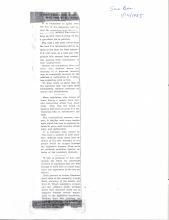
Words that are unreadable or unrecognizable will be replaced by two asterisks.
Sac Bee
1/10/1935
A Good Legislator Gives Full Time to his Work
It is impossible to spend even one day in the legislature and escape the conviction that the ** ** member who tries to keep up with what is going on has a man-sized job to perform.
The road a bill must travel from the time it is introduced until it turns to the floor for final action-if it ever does-is a long one. Frequently bills emerge from committees bearing little resemblance to their original form.
Besides the committees there are other way stations where the meaning of a proposed measure may be completely reversed by the addition or subtraction of a harmless appearing word or two.
To keep track of these bills so the legislature may vote upon them intelligently requires continual research and watchfulness.
Many legislators vote scores of time during a session upon matters concerning which they know little. They find the strain of keeping informed too great in a day requiring fifty to seventy-five roll calls.
The conscientious member, however, is familiar with every matter upon which is vote is required because he gives each measure ample study and deliberation.
It is fortunate both houses always have a number of such members. Without them many bills inimical to the best interests of the people would be slipped through the legislative hoppers. They serve as sentinels guarding against attacks of the predatory interests.
It also is pertinent to note that despite the thirst for patronage credited to legislators they are wise enough to keep men of sound judgment and experience in the key positions.
Such person as Arthur Ohnimus chief clerk of the assembly; Joseph Beek, secretary of the senate, and Fred B. Wood, legislative counsel, and the efficient staffs working under their direction could not be replaced without serious impairment to the legislative machinery. Without their debt handling the legislative ** ** be like an automobile in the hands of a 6 year old boy.
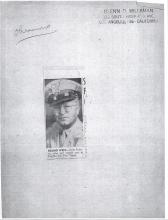
A stamp is shown here that reads:
Glenn D. William
136 South Highland Ave.
Los Angeles, -36- California
Handwritten signature: Ohnimus
A newspaper clipping is placed here which displays a picture of Kyle Palmer wearing a police like hat. The description underneath the picture reads: Bound West-Kyle Palmer, who will report war in Pacific for The Times.
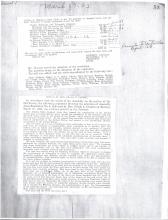
This page displays 2 items.
First item reads:
March 27 – 23
Arthur A. Ohnimus, Chief Clerk, to pay the amounts as itemized below, and the State Treasurer is hereby authorized to pay the same:
Pacific Telephone and Telegraph Company:
Exchange and toll Service for February $10.65 – Check 34
Exchange and toll service for March 12.96 – Check 35
Sleeper Stamp Company, Badges 23.25 – Check 36
Western Union Telegraph Company 7.66 – Check 37
Western Union Telegraph Company 13.65 – Check 38
Remington Typewriter Company:
Rent of typewriters 1-15-23 to 2-8-23 9.00 – Check 39
Wholesale Typewriter Company:
Rent January 8, to February 8 72.00 – Check 40
Rent February 8 to March 8 72.00 – Check 41
Purnell Stationery Company Letter Clips 7.25 – Check 42
Total $228.42 – Receipts to Controller April 16th
Has had the same under consideration, and respectfully reports the same back, and recommends that it be adopted.
(Signed out)
Dawson, Chairman
Mitchell, A. G.
Pedrotti
Rock
Mr. Dawson moved the adoption of the resolution.
The question being on the adoption of the resolution.
The roll was called, and the resolution adopted by the following vote:
Ayes-Badham, Baker, C. C., Baker, Edwin; Ball, Bernard, Bromley, Broughton, Clarke, Cleary, Cleveland, Crittenden, Davis, Dawson, Dean, Douglas, Dozier, McMillan, Miller, Moore, Noyes, Pedrotti, Pomeroy, Prendergast, Rock, Rosenshine, Saylor, Schmidt, Scott, Snyder, Spalding, Weller, West, Williams, Woodbridge, Wright, and Mr. Speaker – 46.
Noes- None
Second item reads:
SPEECH OF HON. FRANK L. COOMBS
In accordance with the action of the Assembly on the motion of Mr. McPherson, the following argument favoring the adoption of Assembly Joint Resolution No. 8, delivered by Hon. Frank L. Coombs on Monday, March 26, 1923, was ordered printed in the journal:
Our fathers little dreamed when they framed the constitution of the United States that it would embrace states beyond the boundaries of the colonies; still less did their vision reach to the shores of the Pacific, where empire has brought to us the problems of many races. So the constitution was made to provide that all persons born of naturalized in the United States, and subject to the jurisdiction thereof, are citizens of the United States.
The one weak spot in the constitution upon citizenship is that it still retains the hope that the children of inassimilable races, regardless as to whether they will remain alien in habits and thought, children devoted to the teachings of parents who cling to the ideas of a land still dearer to them, and who find their traditions in its-religion and folk lore, can forsake for us the land of their fathers. It is a compliment to their character when we say that his cannot be expected. While their adherence to such ideals make admirable manifestations of devotion there, it makes patriotism impossible here. This rises above radical prejudice and becomes a problem of national life.
We must recognize the racial distinctions which keep civilizations apart and create ambitions for separate destinies, for, upon these, states must exist. We recognize that these distinctions are better suited to natural causes and to the impulse of national movements, and we fell that such recognition will avoid consequences inevitable from relations strained and unnatural.
The time has arrived when our far-flung dominions render it necessary to change the requirements of citizenship in order to recognize the distinctions which have separated mankind into different peoples, founded upon traits and characteristics of non-assimilability, with destinies apart, as better suited to the life of peoples who can never achieve together.
It is not our purpose to compare governments or civilizations, to each after its own desire, and man fills the full measure of duty in his adherence to the one. Allegiance is not divisible and should not be tried, and the thought of the East is not forgotten, but has been part from the West, and there is no good reason why they should not preserve their separate purposes. Men have come to our shores from other lands, have come out of different faiths, bout of the faith born of the meditators of Gautama, out of Persian philosophies, out of Shintoism, worshiping heroes whose names are enshrined in the fame of the land over whose destinies rule the spirit of the past, out of that far-away Islam born of the temper of fire and sword, out of the brooding sands of the East where creeds are born, of whatever Pantheon, whatever gods may be, but our citizenship was born of the waves beating upon nearer shores, rock bound, amid the storms of wonderful elements, driving thought after thought till it reached the ultimate purpose, the manifestations of zeal, the Oberammergau of the American drama. In preserving such citizenship, we are not denying to others their rights of preservation.
The East and West can never meet.
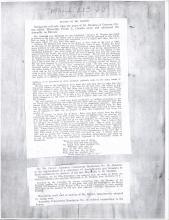
This page displays 2 items.
First item reads:
March 28th 1923
Eulogy by Mr. Coombs
During the roll call, when the name of Dr. Douglas of Crescent City was called, Honorable Frank L. Coombs arose and addressed the Assembly as follows:
Mr. Speaker and Members of the Assembly: Gustave H. Douglas has failed to answer as his named was called, and it will never more be answered in this forum. But we hope it may be called and responded to in a higher hall than this, on a far shore where we may meet him again.
Gustave H. Douglas was born in the State of New York in the year 1860. At the time of his passing away he was sixty-three years of age. During the brief space allotted, he had gone through many experiences, many fights for life, through many hopes and fears, through many trials, and with it all he has administered to struggling humanity; has stood beside the bed of hope and seen the enigma of life ushered into the world; has stood beside the bed of despair and seen life cross the narrow strait that divides us by the frailty of breath. He has seen the phantoms of despair in the last hours, has seen visions of hope, and these have molded his character and made him better fitted for the vicissitudes of life, and its struggles, and it has caused him to indulge in the pursuits that relate to the aspiring of man. He has been engaged in governmental service in a struggle against the disease of the North, swept at times by some contagious wind. He has gone across the troubled waters, amid the ruins of battle and pestilence, and been decorated by the white hands of a Queen. He has raised from poverty and disease, so far as he could, and so far as his administration of relief could go, the little children who seem to have come in to this world without the rays of hope. He has returned and gone back to struggling again in the old fields, returned after the decorations by the hands of a Queen in thoughtfulness of his administration and his mercies to children to be decorated by garlands, garlands made by the hands of affection.
He has come to the Legislature from those who sent him here to make laws for this great country of ours, and as I saw him for the first time, and talked to him before the recess, it came to me that there was a man to live, a man whose friendship was desired; there was the man whom you would like to draw closer, and knit closer to you in the sacred bonds of friendly relation. But that inspiration does not go out to all men. It is only a few of those who innate qualities recommend themselves to the souls of others, and I believe that was the character of Dr. Douglas.
He was engaged in a work here more specifically of building something in the far North that would span the ridges between there and us-the Klamath that has poured from the mountains down to the sea in its impassable splendor. His plan was to bridge this, that the footsteps of man might be led beyond what we dare call the centers of civilization. That was his greatest hope here, and I know that out of response to that, out of memory of him, this Legislature will carry his project on.
Life is strange, we know not of death. Since man first leaped from the shores washed by the tides of an elder world and came struggling here, one question has been asked and asked-“If a man dies shall he live again?” The only answer to it is the hope that a man does not go out into darkness, for the wish is father to the thought, the thought of immorality in the world to come. But I believe that we should consider these things in a philosophical light. Man is born, he comes into the world and sheds his rays of light and his blessings, and they remain imperishable. These things cannot go out with him, they remain a part of the race. There is some spark in the sky that shines nevertheless on you and me, some little influence, some little touch of the vanished hand, some little remembrance of the voice that is still, and no matter how humble, we have not lived in vain. I believe that we should treat life, not as a mystery, but as something philosophical, and when we go out it should be with the philosophy expressed in the beautiful words of Swinburne:
“From too much love of living,
From hope and fear set free,
We thank with brief thanksgiving,
Whatever gods may be,
That no life lives forever,
That dead men rise up never,
That even the weariest river,
Winds somewhere safe to sea”
Second item reads:
By Mr. Carter: Assembly Concurrent Resolution No. 16-Relative to the appointment of a committee of Assemblymen and Senators to draft resolutions in memory of the late Honorable G. H. Douglas.
WHEREAS, An All Wise Providence has removed from our midst by death, our esteemed colleague and associate, Honorable G. H. Douglas; now, therefore, be it
Resolved by the Assembly, the Senate concurring, That the Speaker of the Assembly appoint five members of this body, and that the President of the Senate appoint five members of the Senate to act as a Joint Committee to draft suitable resolutions in the member of our late and esteemed colleague, Honorable G. H. Douglas.
Resolution read, and on motion of Mr. Carter, unanimously adopted by rising vote.
Assembly Concurrent Resolution No. 16 ordered transmitted to the Senate.
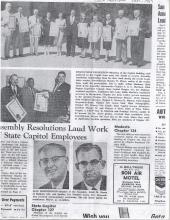
This page displays a single newspaper clipping that shows a variety of content.
First content:
There are two images shown. The first image is of 11 people standing next to each other, 10 of which is holding a certificate. The other image is of 3 men, 2 of which is hold the certificate and the other is pointing at the certificate.
There is a description next to the pictures it reads: Resolutions Presented- Members of the Capitol Building staff gathered on the Capitol lawn early this month to receive Assembly resolutions commending them for their work during the recent Legislative session. Assemblyman Charles W. Myers, author of the resolutions, made the presentation. Left to right: Arthur Ohnimus, Chief Clerk of the Assembly, Sacramento Chapter 2; A. C. Morrison, Chief Deputy Legislative Counsel, State Capitol Chamber 127; Joe Maloney, assistant supervisor, Legislative bill room; Edith MacNair, legislative secretary to the speaker, Chapter 127; Betty Coffey, private secretary to the speaker, Chapter 127; Assemblyman Meyers; Merle Bierney, chief telephone operator, Chapter 2; Western D. Munroe, First Deputy Sergeant-at-Arms, Chapter 127; Grace Stall, Chief Stenographer, Chapter 127; Warner Van Gundy, State Capitol Garage Attendant; Rainbow Chapter 92, and Vincent J. Strei, Chief of State Police, Chapter 2. Left-Roy H. Eberlein and Domingo Correia, unable to be present for the above picture, received their resolutions from Assemblyman Meyers the next day in the room where they work as duplicating machine operators. Both are members of Chapter 127.
Second content:
An image of two men is shown next to each other. Description underneath their picture reads: ALSO REMEMBERED- Speaker o the Assembly, Ralph M. Brown of Modesto, left, and Speaker Pro Tempore Carlos Bee, Hayward, also received commendatory resolutions. The full House joined Assemblyman Meyers as co-authors.
Third content:
Modesto Chapter 124
Two new officers were elected to vacancies during the August 13 meeting of Chapter 124, was reported by Chapter Secretary Virginia Wulf.
Thomas Hanley was elected Secretary-Treasurer, replacing Rachael Grothman who resigned because of poor health; Miss Wulf replaced Clara Graham, resigned, as recording secretary.
Fourth content is an ad for Bon Air Motel it reads:
In HOLLYWOOD
The New AAA
Bon Air Motel
Welcome CSEA
MEMBERS WITH
SPECIAL RATES
Air-Conditioned Rooms
Courtesy Coffee-Phones
TV-comb Tub & Showers
Heated Pool
Call HO. 4-4154 Collect
For Reservations
1727 N. Western Ave.
*This newspaper also shows a variety of other content as well however they are cut off and unrecognizable.
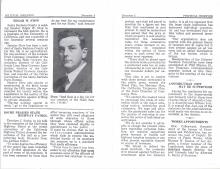
POLITICAL OBSERVER December 2
EDGAR W. STOW
Santa Barbara County is sending Senator Edgar W. Stow to represent the 31st district. He is a graduate of the University of California, and was a member of the Assembly several sessions ago.
Senator Stow has been a resident of Santa Barbara County all his life. He is an agriculturist. He was secretary of the Johnson Fruit Company, president of the Goleta Lima Bean Growers Association; director of the California Lima Bean Growers Association; director of the California Walnut Growers Association, and member of the Citrus Committee of the Santa Barbara Farm Bureau.
Senator Stow also admits to membership in the third house during the 1931 session. He represented his county before the Legislature in the matter of the beach protection against drilling by private interests.
“Having nothing special in mind I go to the legislature to do my best for my constituency and for my State,” said Senator Stow. “And that is a big job for any member of the State Senate, I think.”
An image of Edgar W. Stow is shown here.
ROCHE PRAISES STATE HIGHWAY PATROL
Theodore J. Roche, in his talk to the members of the California Highway Patrol at the recent convention of the California Highway Patrol at the recent Highway Patrol, stressed the importance of the united as a law enforcing body. Experts from the address follow:
“To some degree the efficiency of the patrol has been impaired by a divided allegiance on the part of some of its members. It has been assumed by the them that after becoming members of the patrol they still owed allegiance of some character to those through whose official action they were rendered eligible to appointment to the patrol…It must be obvious to that no law enforcement administration which fails to receive the undivided loyalty of its members can measure up to a standard that spells efficiency.
“From time to time it has been called to my attention that upon occasions some of the officials of that patrol feel reluctant to mea-
*the rest of this is not shown
December 2 POLITICAL OBSERVER
protest, and shall sell parcel in question for a figure not less than that mentioned in said protest. It shall be understood and agreed that the price at which property is sold shall be considered the assessable value for three consecutive years, unless changes or improvements be completed within the period of three years, in such event the assessor must reassess.
“There shall be placed upon statute books provision for a graduated sales tax on sales commencing at over and above one thousand dollars per annum.
“Our plan is not in conflict with those already mentioned in the public press, namely the Breed Plan, the Merriam Plan, the California Taxpayers Plan, or the State Chamber of Commerce Plan.
“We exempt the modest home to encourage the pride of ownership which is the major actuating motive underlying good citizenship. We urge and advocate the graduated sales tax for the purpose of restoring to ourselves the power of individual assertiveness.
“We do not consider it advisable to change the present state laws regarding corporate taxation, nor taxation supporting given bureaus or boards nor highway taxation incomes or any other present equitable channel or source of revenues.
“We intend to defend the small merchant, the moderate civic interest against further encroachment upon his inherent rights. It is all too apparent that the large chain institution has destroyed individual opportunity and has devitalized real estate values and personal incentives.
“Our organization does not quarrel with the general theory of taxation now in vogue but it does protest against an ad valorem and an unfair distribution of the tax burden which it brings.
Headquarters of the Citizen’s Taxation Committee have been established at 2742 Mission St., San Francisco. Correspondence urgently invited at this time, prior to the meeting of the Legislature.
ASSEMBLYMAN JOST MAY BE SUPERVISOR
Among the candidates for appointment to the Supervisorial seat formerly held by Supervisor Charles Heyer of Alameda County is Assemblyman William Jost. It is argued that Jost, one of the stalwarts for the administration, could easily win election as an incumbent in the district.
WORKS APPOINTMENTS
Eric Cullenward, formerly chief of the bureau of Documents and Publications, has assumed the post of Deputy Director of Public Works, while Morgan W. Keaton, of Los Angeles, a former member of the Legislature, takes the place of assistant deputy director, the post formerly held by Albertus L. Banks of Stockton.
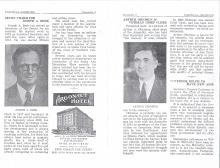
POLITICAL OBSERVER December 2
Several Charm For Joseph A. Beek
Joseph A. Beek has served as Secretary of the Senate for six sessions. He started work in 1913 as Assistant Secretary and held the same office again in 1915. He was elected minute Clerk in 1917 and Secretary in 1919. He has severed continuously as Secretary since 1923. Joe lives at Balboa in Orange County, where he is interested in harbor development and is always serving in the promotion of yachting activates. Joe Beek has always been active in aquatic sports, has a whole shelf of trophies and, what he is most proud of, two boys aged five and eight years, both of whom are already competing in swimming and sailing races.
His small boat has carried many a member of the Legislature and state officials for trips out on the Pacific.
Joe has long been an enthusiast on forestation, having brought to the attention of science and secured the identification of a new species of pine found only on Santa Cruz Island, off the coast of Southern California.
Several years ago he began rather extensive experiments on forestation of the Santa Ana Mountains. More recently his major interest has been the relief of unemployment, which he has coordinated with his interest in trees, and has been devoting himself to putting men to work planting trees in the mountains in the southern part of the state.
Argonaut Hotel
An image here of a hotel
Society of California Pioneers Building
Fourth and Market
San Francisco
Rates: $1.00 to $3.00
Special Rates to Families
Free Garage for Guests
Free Auto Buses Meet all Trains
December 2 POLITICAL OBSERVER
Arthur Ohnimus is Veteran Chief Clerk
Presented here is a picture of Arthur A. Ohnimus, chief clerk of the Assembly, who has held that important post so long that “the memory of man runneth not to the contrary.”
*An image of Arthur Ohnimus is shown here.
Ohnimus is probably the oldest attaché in point of legislative service in the Legislature. He began his work with the Assembly in 1915 as secretary of the Committee on Insurance. Next session he was Bookkeeper. And then followed his appointment as Minute Clerk, which position he filled during the famous King tax episode (admirers point to the fact that all during this hectic intricate legislative struggle no once were the minutes challenged).
In 1923 Ohnimus was elected Chief Clerk, and has been honored with re-election during each successive session-we think unanimously.
Arthur Ohnimus is known for his sincerity, his careful attention to duty and his workmanship. But perhaps his most valuable asset is his tactfulness. He is an assistant in the office of the District Attorney of San Francisco. It is not too early to predict that Arthur will be selected again this session, particularly because of the general forecast that this one will call for knowledge, ability and that undefinable quality of personal fitness.
Governor Rolph to have New Aide
Secretary Francis Cochrane is to leave the office of Governor Rolph, according to administration leaders. He is to move to his home city of Los Angeles.
It is understood that the Governor is to appoint a successor from a list of available candidates who understand Legislative work, and who can help the members of the Senate and Assembly understand the difficult problems certain to arise during the session which directly concern the advancement of the State government and its officials.
Newspaper references to William H. McCarthy have been incorrect, as the McCarthy referred to is not the baseball magnate. Assemblyman Patterson, also mentioned, is not available.
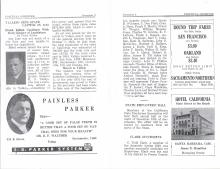
Political Observer December 2
VALLEJO GETS STATE CAPITOL IN 1850
Frank Killam Continues with Early History of Legislature
By Frank Killam
San Jose was not much of a city then and was unable to house the Legislators.
Hotel owners raised the price of rooms; restaurants raised prices; worse still preference was given to lobbyists rather than to members. All of this caused dissatisfaction. General M. G. Vallejo who was a member offered a site in Vallejo,-consisting of 164 acres-and agreed that he would within three years, raise $371,000 with which to erect a capitol building.
An act was passed for the removal to Vallejo and it came up at the general election held on October 7, 1850. At that time, the total population of the state of California was estimated at 100,000 and the total vote cast was 10,729. Of the total votes cast in 1820, Vallejo received 7,377; San Jose, 1,292; Monterey, 399; Sacramento, 160; Downieville, 150, and Eureka, 301.
Moved to Vallejo
The balance was scattered among the various cities of northern California. Consequently, in the year 1851 the seat of government was moved to Vallejo. NO provision had been made to take care of the Legislature.
An advertisement is shown here it reads:
Painless Parker
An image of E. R. Parker is shown here.
Says-
“A GOOD SET OF FALSE TEETH IS BETTER THAN A POOR SET OF NATURAL ONES FOR YOUR HEALTH”
DR. E.F. WALTER
925 K Street Sacramento, Calif.
E. R. Parker System
December 2 POLITICAL OBSERVER
Los Angeles County are: James H. O’Conner, C. Don Field, Chas. A. Hunt, Frank G. Martin, Frank W. Wright, William Moseley Jones, Charles W. Grubbs, E. V. Latham, Frank J. Rogers, Austin L. Tournoux, Bert V. Callahan, Ken H. Redwine, John D. McCarthy, Herbert S. Hallner, James J. Boyle, Cecil R. King, John T. Rawls, Walter H. Sullivan, Ira S. Hatch, Hobart R. Altar. James B. Utt takes his place from new district in Orange County. John P. Phillips succeeds Chester Kline of Riverside County. Bruce R. Stannard takes the place of Ed. L. Head and Charles W. Stream takes Arthur Honnold’s place, Honnold not running. Ford A. Chatters will represent Tulare County, formerly the seat of Augustus F. Jewett. Clare Woolwine, Charles Lyon and Herbert Evans (Los Angeles) all have seen Legislative service.
State Employee’s Ball
Members of the California State Employees Association will hold their annual ball on the night of December 10th at Sacramento. The affair will be attended by members from all parts of the state.
Clark Successful
C. Todd Clark, a member of the Assembly during 1929, was another successful candidate for Supervisor. Clark won the seat in his district in Fresno County.
An advertisement is shown here it reads:
ROUND TRIP FARES
On Sale Daily
SAN FRANCISCO
and Return
$3.60
OAKLAND
and Return
$3.40
10-DAY RETURN LIMIT
Low Fares to All
Other Points
SACRAMENTO NORTHERN
UNION ELECTRIC STATION
12th and Eye Sts. Main 5720
An advertisement is shown here it reads:
HOTEL CALIFORNIA
State Street at the Beach
An Image of the Hotel shown here
SANTA BARBARA, Calif.
James E. Hamilton
Managing Owner
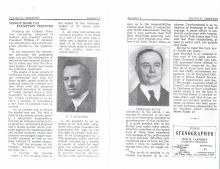
POLITICAL OBSERVER December 2
MODEST HOME TAX EXEMPTION PROPOSED
Forming the Citizen’s Taxation Committee, composed of realtors and property owners, President William F. Altvater has announced a tax reform program adopted by the organization.
In the statement the committee advocates the graduated sales tax and the elimination of real estate and personal property tax in values less than five thousand dollars. Altvater has issued the following statement:
“The league of home owners of California views with trepidation the irrefutable fact that the State budget cannot possibly be balanced under the present system. Even with the proposed horizontal deduction of expense of twenty percent there is little possibility of an equitable budget. Unless California is to assume a position of retardation a new form of taxation must be evolved.
“An ad valorem tax is always the easiest way out. Yet such a method has always proven merely a temporary amelioration, forming an extreme hardship for progressive commercial progress and a double burden which militates against the small merchant and modest property owner. Our proposal encourages proper mercantile interests as well as our good citizens of modest means.
“In brief the program of the Citizens’ Taxation Committee provides for-
- Exempt the humble home of the working man to the extent of five thousand dollars of its actual sales value
- All other real estate and personal property to be taxed at a rate of no more than a dollar and a quarter per hundred of its full actual sales value, which shall be inclusive of city, county, state and school district.
*A portrait of W. F. Altvater is shown here.
- All property to be assessed at its full sales value. And if the owner considers the assessment too high he has the right of protest. Said protest to be accompanied by a title insurance policy, and the protest recorded as a matter of record, in which he shall state his estimate of worth. The Assessor may hold a public auction annually offering for sale every parcel under tax…
December 2 POLITICAL OBSERVER
sure up to the responsibilities resting upon them in connection with traffic enforcement, fearing that if they perform their full duty individuals asserting political or other prestige may interfere with their future status or usefulness in the patrol. I am making no criticism of the men who have heretofore indulged in apprehensions of this character. It is quite possible that in the distant past under other administrations members of the patrol have at times been interfered with because of the performance of their full duty. Whether such conditions have or have not prevailed I have no hesitation in stating that they no longer exist.
*A portrait of Theodore Roche is shown.
“The public is entitled to be treated courteously by its employees. Courteousness is no indication of weakness or lack of courage. A peace officer is constantly confronted with temptation and to their honor may it be said that these temptations, at least in major part, are quickly cast aside.
Having in mind the high pur-3-Under the Dome.. …. …. ……..pose intended to be attained in this unit of the state government, Governor Rolph very happily appointed three officials to immediately supervise its destiny all of whom have had both law and traffic enforcement experience, viz: E. Raymond Cato, Chief of Patrol, Russell Bevans, Chief of Registration, and Geo. F. Moynahan, Assistant Chief of Patrol. I am convinced that here in California we have a highway patrol which if not the best in the United States is excelled by none other, and that it has acquired its enviable position because its future has been assured and destinies safeguarded by its Supreme Chief, Governor James Rolph, Jr.
An ad is shown here it reads:
PUBLIC
STENOGRAPHER
MISS M. LAFFERTY
Legislative Experience
EVENINGS BY APPOINTMENT
Main 2270
Telephone-
Office:
Home:
CAP, 4645-R
409 Plaza Bldg., Sacramento, Calif.
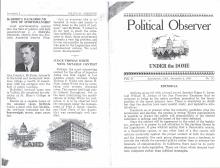
December 2 POLITICAL OBSERVER
McBRIDE’S BACKGROUND ONE OF SPORTSMANSHIP
Good sportsman ship carried into the field of politics will help Assemblyman J. J. McBride, Democrat, elected from the Fortieth Assembly district (Ventura County). McBride, formerly in the hotel and restaurant business, brings a wealth of experience with his entrance into the field of public business.
*A portrait of a man is shown here. Does not specifically state who he is, it might be J. J. McBride.
McBride’s boyhood home was in Vallejo. He completed his education at St. Mary’s College in Dublin.
Known as a capable boxer of the amateur ranks McBride boasts a draw with Bob McAllister, one-time contender for the heavyweight crown, some years ago.
An image of the top of the capitol building with the words Hotel Land over it is shown here.
“Just as everyone else interested in ways and means to bring taxes to the point of justness,” said McBride. “I intend to do my part to study the situation carefully. I have no pet theories or ideas. State government presents a very big problem, and no one can possibly be successful who goes to the Legislature with pre-convinced notions. We must await developments.”
JUDGE THOMAS WHITE WINS NOTABLE CONTEST
Perhaps the most interesting contest for the office of Superior Judge was that waged in Los Angeles County between Judge Thomas P. White and James H. Pope. Judge White won by something over seventy thousand votes. The contest held high public interest throughout. Not in the least minimizing the qualifications of Judge White for reelection, it is to be observed that the campaign under the management of Fred J. Desch (Assistant Chief Clerk of the Assembly) was exceedingly well handled.
An image of a building is shown here.
Political Observer
A drawing type image of the Capitol Building is shown here.
UNDER the DOME
VOL. II Sacramento, Calif., December 2, 1932 No. 111
EDITORIAL
Striking at an evil with a broad sword, Speaker Edgar C. Levey told William H. Jordan of the San Francisco Examiner that he proposes to bring up the entire problem presented by the incongruities of the direct primary laws. There is absolutely no doubt but that the election laws need careful study, and legislative ministrations.
Inasmuch as at present often the minority candidate wins the nomination and election, the system is wrong. Where manipulation is possible to thwart the public will responsibility of the elected candidate is lacking, and the intent of the voter defeated.
Since the subject will be uppermost in the mind of the legislator, perhaps it is proper to call attention to the partisan threat in the Legislature. It goes without saying that a Democratic caucus, or a Republican caucus, or any other kind of a bloc caucus will militate materially against the proper conduct of both the Senate and the Assembly. For such group alignments have a tendency to provide the vehicle for personal politics rather than to advance the interests of statesmanship. In California there need be no party alignment in state legislation. These are times which demand business judgment rather than political strategies.

